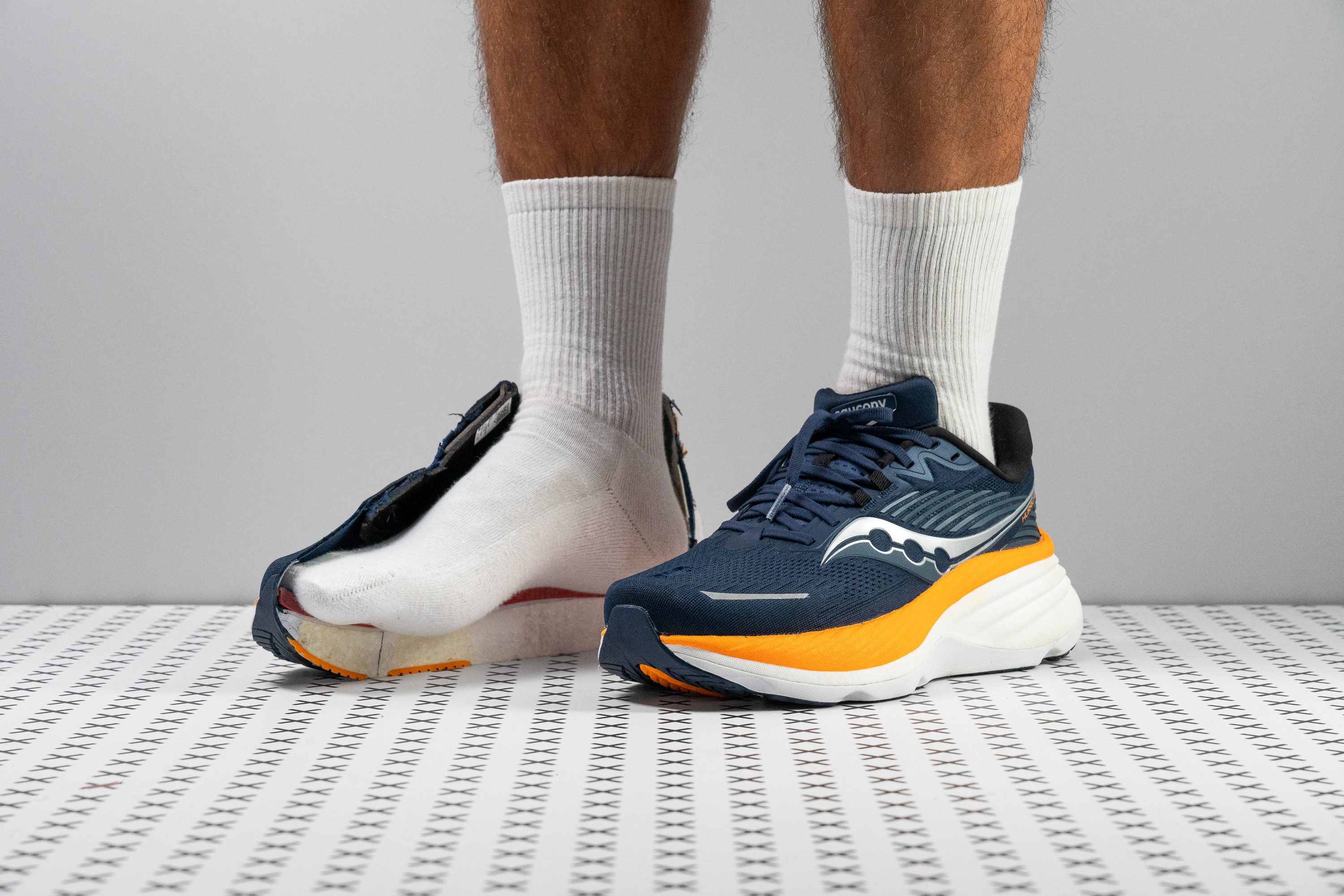Our verdict
Pros
- Incredibly stable ride
- Comfortable and plush upper
- Excellent build quality
- Spacious toebox
- Breathable
- Fantastic value
- 360-degree reflectivity
- Compatible with all footstrikes
- Amazing shock absorption!
Cons
- Non-gusseted tongue
- Upper lacks durability
- Could be a touch lighter
- Not ideal for narrow feet
Audience verdict
- Top 29% most popular running shoes
Comparison
The most similar running shoes compared
+ + Add a shoe | |||||
|---|---|---|---|---|---|
| Audience score | 87 Great! | 80 Good! | 82 Good! | 85 Good! | |
| Price | $160 | $125 | $170 | $140 | |
| Pace | Daily running | Daily running | Daily running | Daily running | |
| Shock absorption | High | High | High | Moderate | |
| Energy return | Moderate | Moderate | High | Moderate | |
| Traction | High | High | High | High | |
| Arch support | Stability | Stability | Stability | Stability | |
| Weight lab Weight brand | 11.1 oz / 315g 11.2 oz / 317g | 8.1 oz / 231g 8 oz / 228g | 10.1 oz / 286g 10 oz / 283g | 10.4 oz / 295g 10.5 oz / 298g | |
| Lightweight | ✗ | ✓ | ✗ | ✗ | |
| Drop lab Drop brand | 6.3 mm 6.0 mm | 9.4 mm 5.0 mm | 7.1 mm 6.0 mm | 9.3 mm 8.0 mm | |
| Strike pattern | Mid/forefoot | HeelMid/forefoot | Mid/forefoot | HeelMid/forefoot | |
| Size | Slightly small | Slightly small | - | Slightly small | |
| Midsole softness | Soft | Soft | Soft | Soft | |
| Difference in midsole softness in cold | Normal | Big | Small | Big | |
| Toebox durability | Bad | Bad | Decent | Decent | |
| Heel padding durability | Decent | Decent | Decent | Bad | |
| Outsole durability | Decent | Bad | Good | Decent | |
| Breathability | Breathable | Breathable | Warm | Moderate | |
| Width / fit | Medium | Narrow | Medium | Medium | |
| Toebox width | Medium | Narrow | Medium | Medium | |
| Stiffness | Stiff | Moderate | Moderate | Moderate | |
| Torsional rigidity | Stiff | Stiff | Stiff | Moderate | |
| Heel counter stiffness | Moderate | Stiff | Stiff | Stiff | |
| Rocker | ✗ | ✓ | ✓ | ✗ | |
| Heel lab Heel brand | 40.5 mm 42.0 mm | 36.0 mm 33.0 mm | 40.2 mm 38.0 mm | 36.8 mm 38.0 mm | |
| Forefoot lab Forefoot brand | 34.2 mm 36.0 mm | 26.6 mm 28.0 mm | 33.1 mm 32.0 mm | 27.5 mm 30.0 mm | |
| Widths available | NormalWide | NormalWide | NormalWide | NarrowNormalWideX-Wide | |
| Orthotic friendly | ✓ | ✓ | ✓ | ✓ | |
| Season | SummerAll seasons | SummerAll seasons | All seasons | All seasons | |
| Removable insole | ✓ | ✓ | ✓ | ✓ | |
| Ranking | #336 Top 50% | #318 Bottom 16% | #290 Bottom 24% | #220 Bottom 42% | |
| Popularity | #197 Top 29% | #56 Top 15% | #129 Top 34% | #40 Top 11% |
Who should buy
After extensively testing the Saucony Hurricane 24 in the lab and on various roads, we think it’s a superior choice if you:
- Want a maximalist yet stable daily trainer and weight isn't a concern.
- Need a stability shoe that combines world-class cushioning.
- Are looking for a supportive shoe with a comfortable, roomy upper that feels premium from top to bottom.
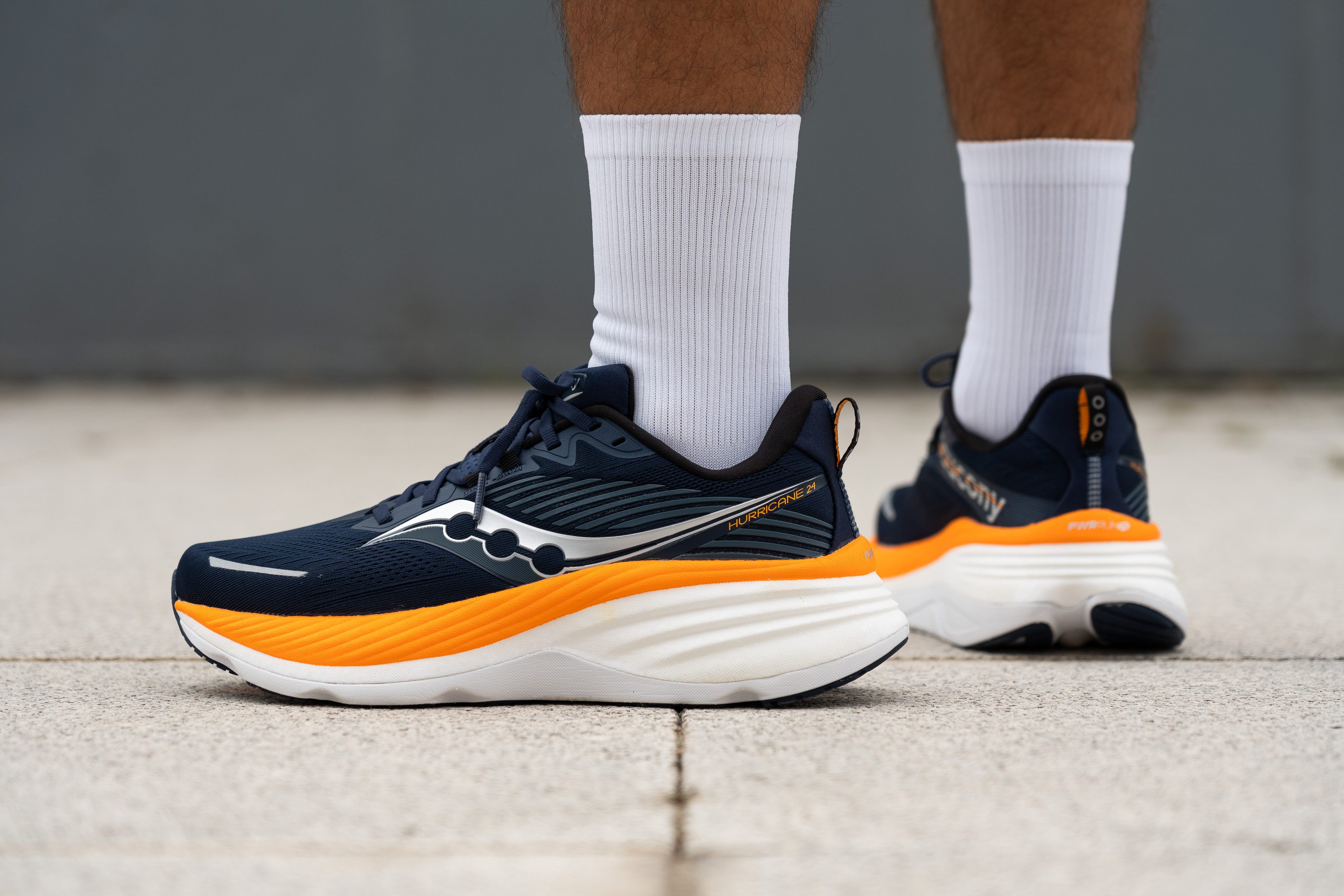
Who should NOT buy
In our lab, we found the durability of the Hurricane 24's upper to be lacking, which may be a significant drawback for runners prone to wearing out their shoes quickly. If durability is a concern, we do not recommend this model and suggest considering the ASICS Gel Kayano 31.
We also think the Hurricane 24's weight might be a dealbreaker for those who prefer lighter shoes. If you don’t require extensive support, we believe the Triumph 22 and the Guide 17 are better alternatives inside Saucony. Additionally, we recommend the Hoka Arahi 7 for those who want a more compact shoe without sacrificing stability.
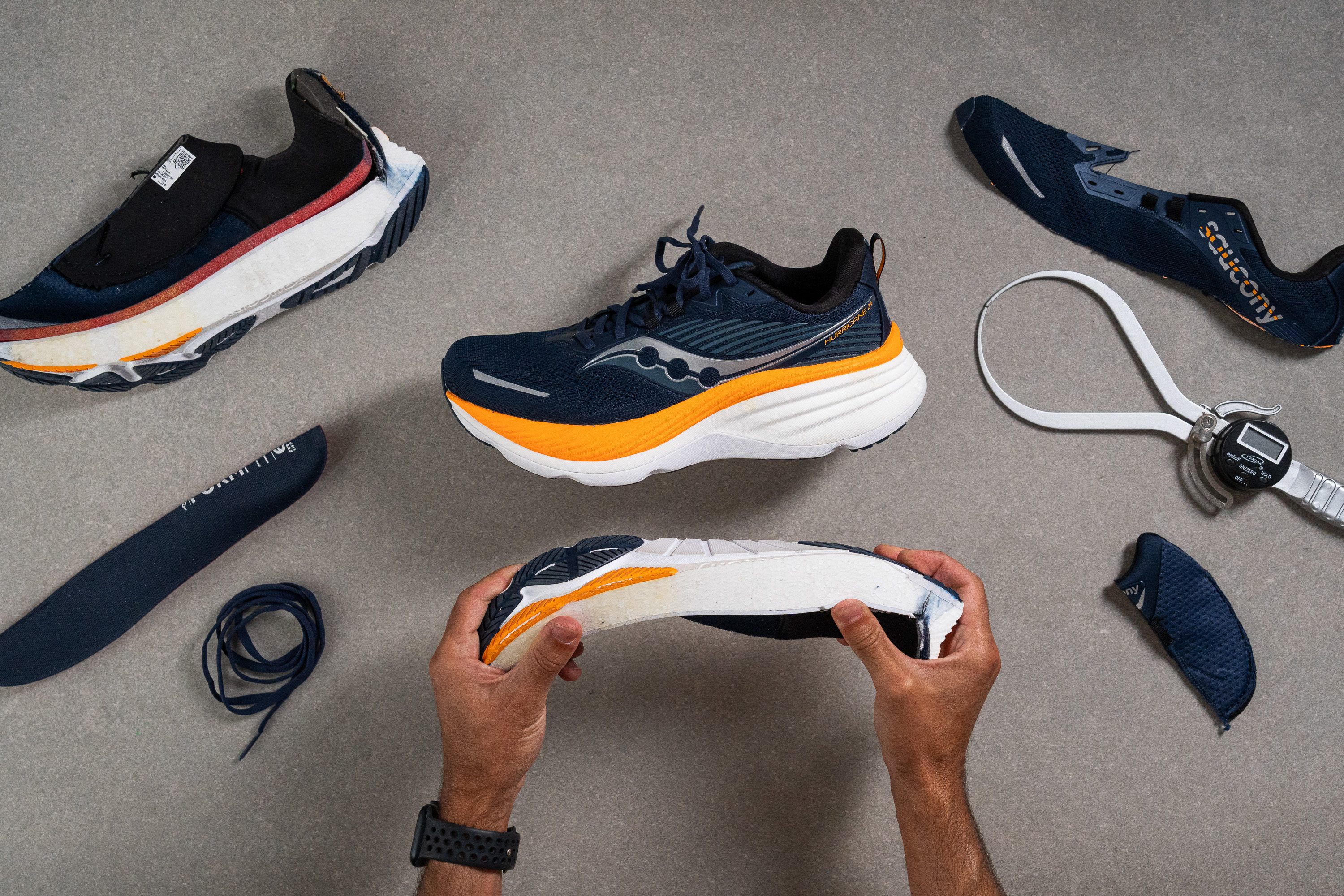
Cushioning
Shock absorption
If you’re after maximum cushioning, the Hurricane 24 is a strong contender with its huge midsole. We measured 142 SA in the heel and 135 SA in the forefoot, both well above the average in our lab tests.
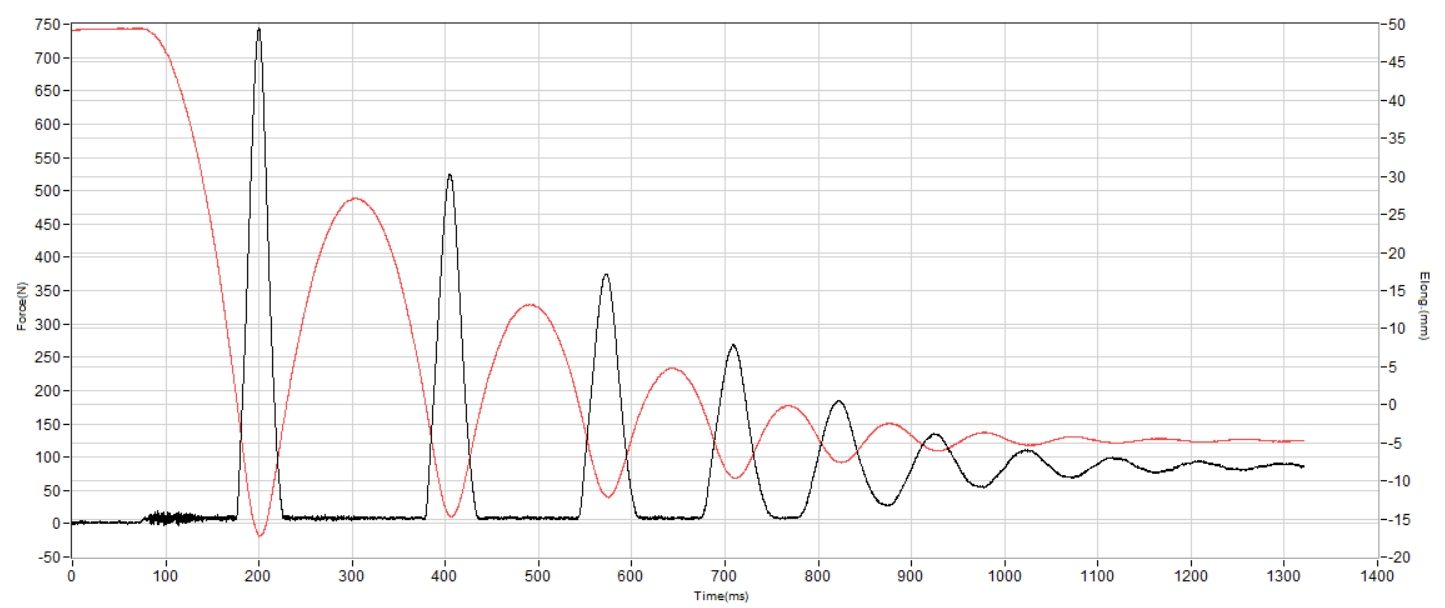
| Hurricane 24 | 142 SA |
| Average | 130 SA |
Energy return
Cushioning is sky-high, but energy return falls into the average zone. We expected more than 59.8% with PWRRUN PB onboard, yet the added layer of PWRRUN flattens the ride and holds back its speed potential.
| Hurricane 24 | 59.8% |
| Average | 58.6% |
Heel stack
Although the Hurricane 24 is on the heavier side, it compensates with a substantial 40.5 mm stack height in the heel, offering impressive cushioning.
This makes it a reliable choice for heavier runners who seek substantial support for their joints and bones over many miles.
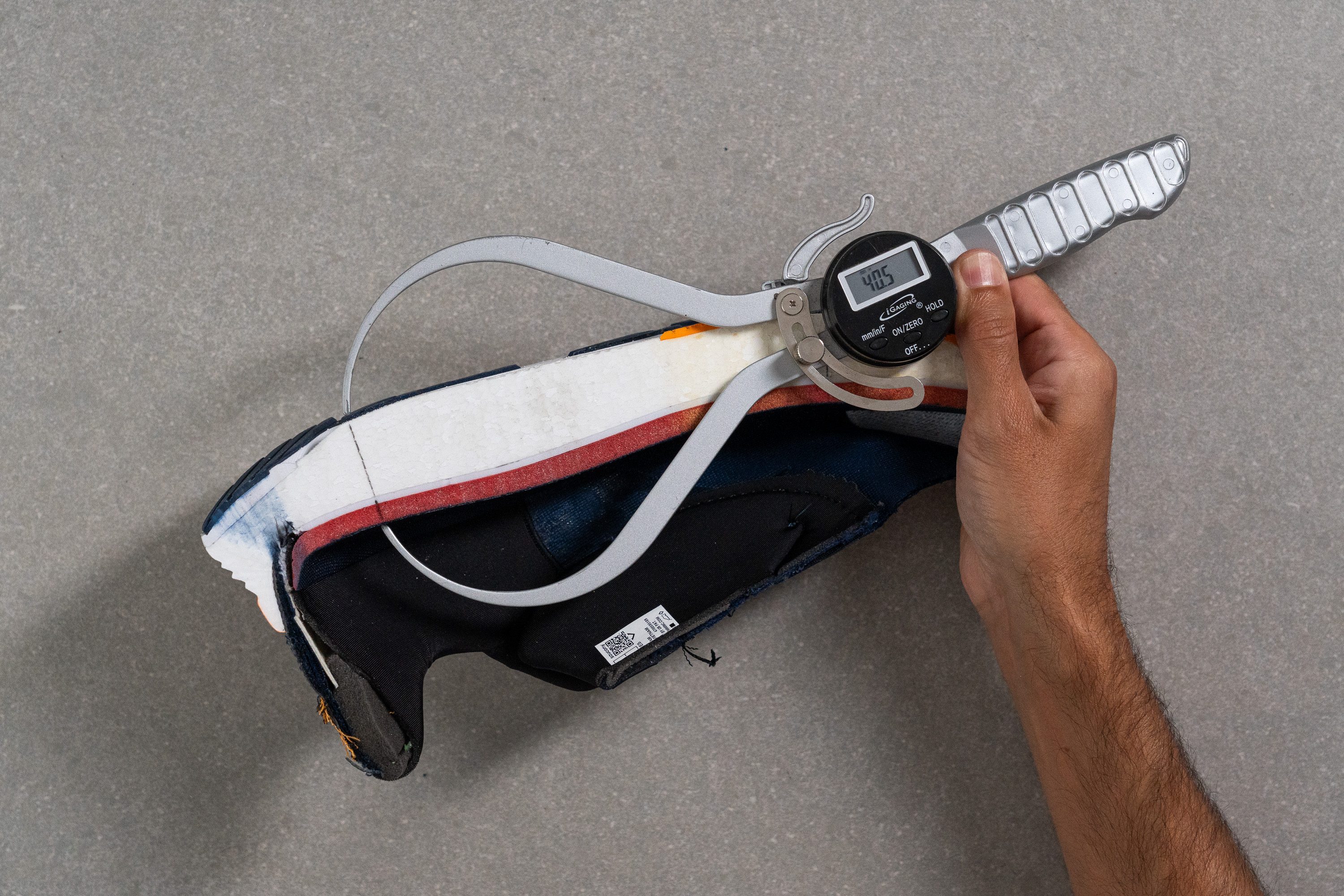
| Hurricane 24 | 40.5 mm |
| Average | 34.8 mm |
Forefoot stack
The forefoot of the Hurricane 24 offers outstanding protection, easily surpassing the 30-mm threshold with a generous 34.2 mm thickness—meticulously measured with digital calipers.
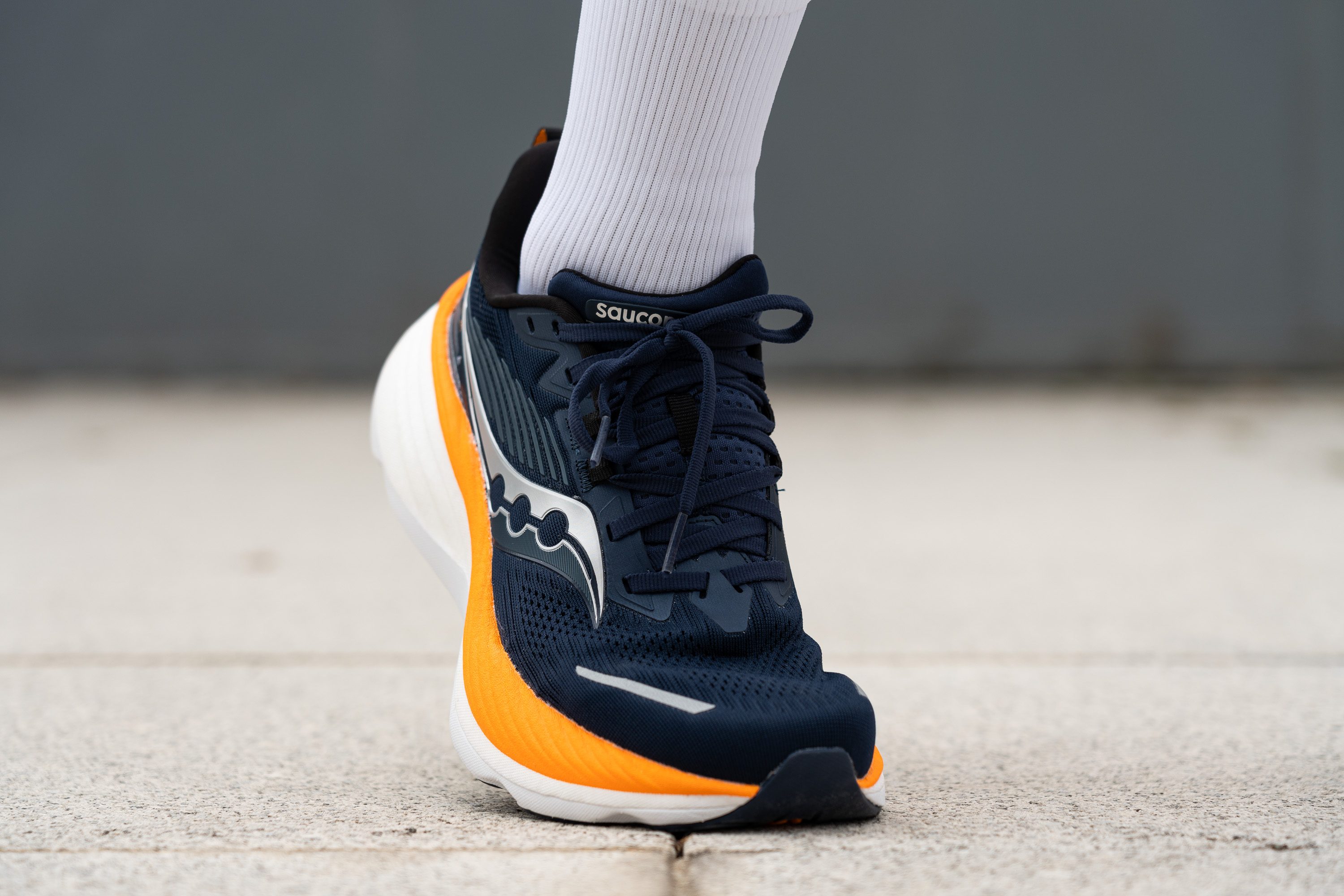
To illustrate just how cushioned the Hurricane 24 is, consider this: the forefoot cushioning alone matches or even exceeds the heel stack heights of many daily trainers! This level of cushioning truly sets the Hurricane 24 apart for midfoot and forefoot strikers.
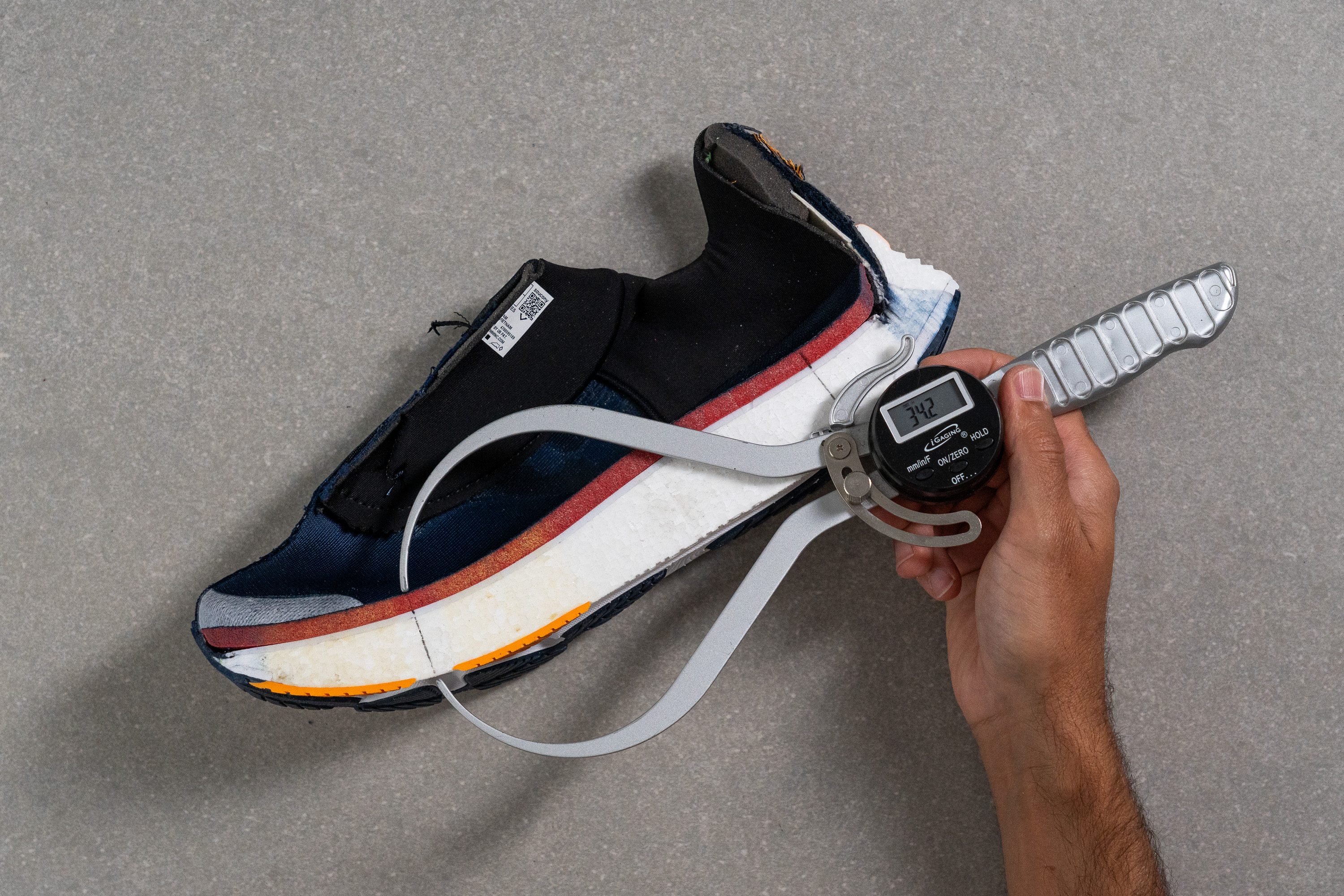
| Hurricane 24 | 34.2 mm |
| Average | 26.2 mm |
Drop
Saucony advertises the Hurricane 24 as a mid-drop shoe with a 6-mm offset, and we can confirm that our precise measurements found a close match at 6.3 mm—a slight variation likely due to manufacturing tolerances. To put this minor difference into perspective, 0.3 mm is roughly the thickness of two strands of hair.
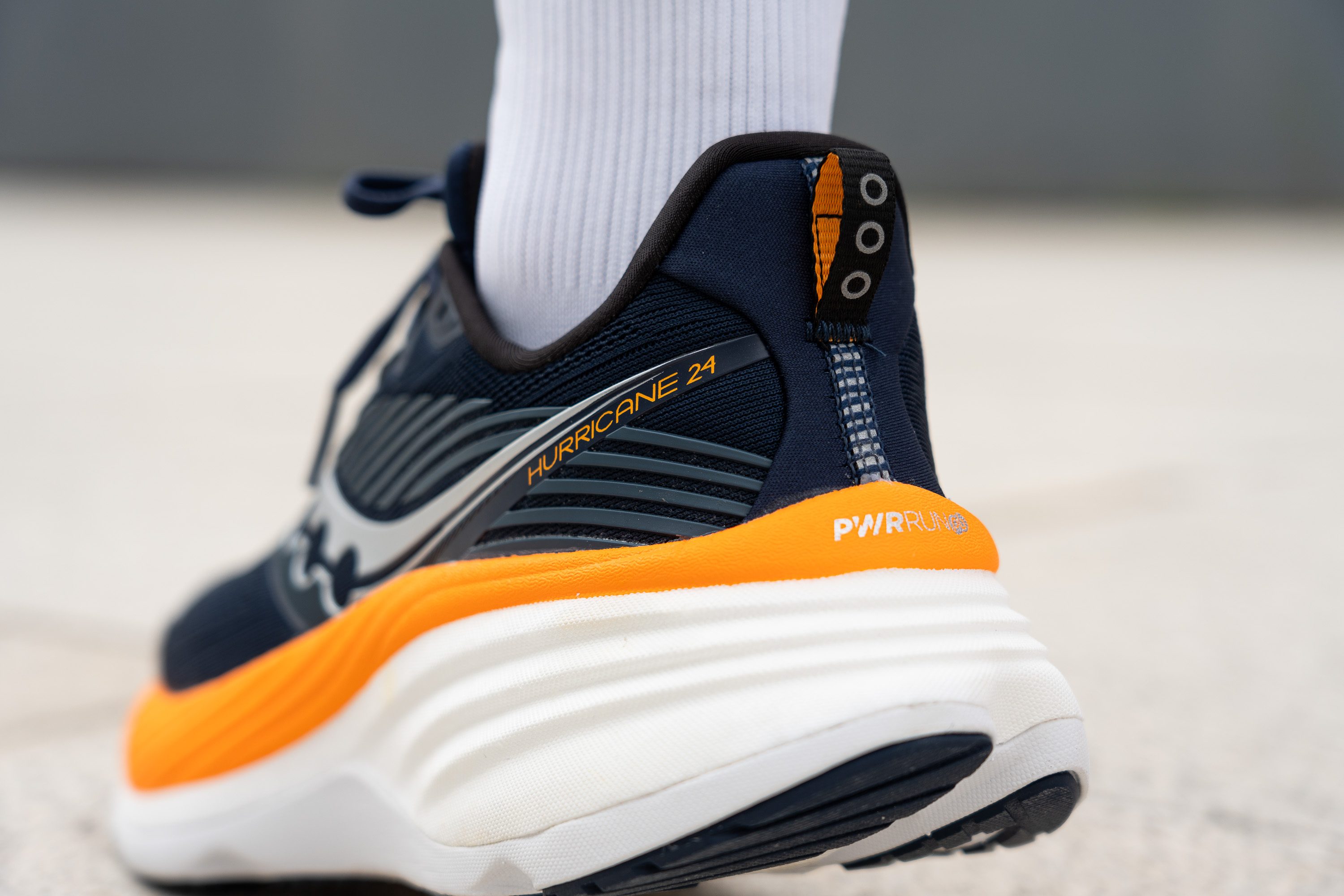
This moderate drop makes the Hurricane 24 versatile enough for all types of footstrikes, although in our experience, it particularly excels for midfoot strikers.
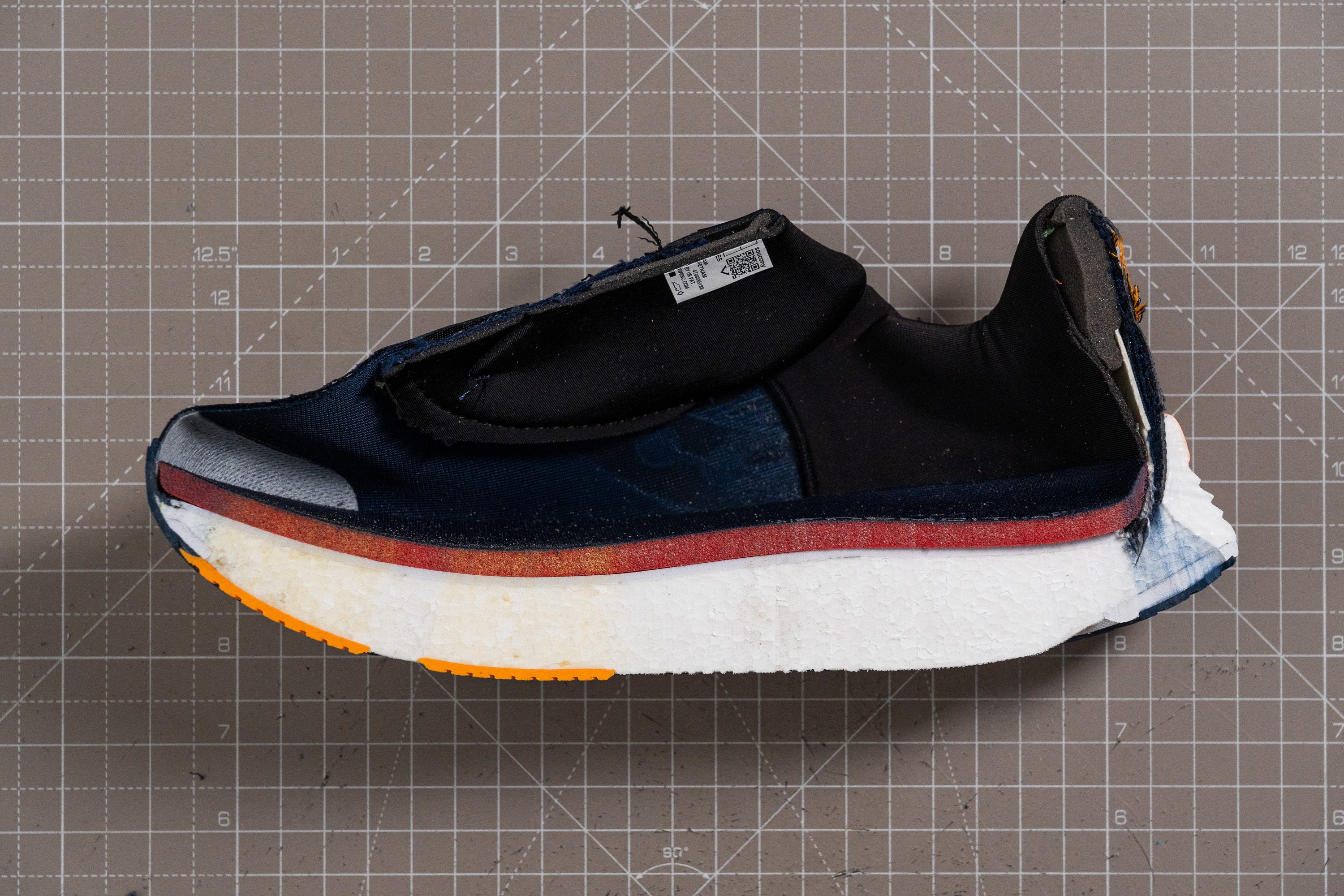
| Hurricane 24 | 6.3 mm |
| Average | 8.6 mm |
Midsole softness
UpdatedLet's focus on the midsole. Saucony has enhanced many of its recent trainers with the superior PWRRUN PB—a true superfoam crafted from Pebax—and we're excited to confirm that this advanced material is present throughout nearly the entire midsole of this shoe.
During our test runs, the ride felt a bit firmer than the 31.5 AC our durometer recorded. This discrepancy is due to the PWRRUN foam that encases the substantial PWRRUN PB core. However, we still think that this midsole is remarkably plush for being a stability shoe.
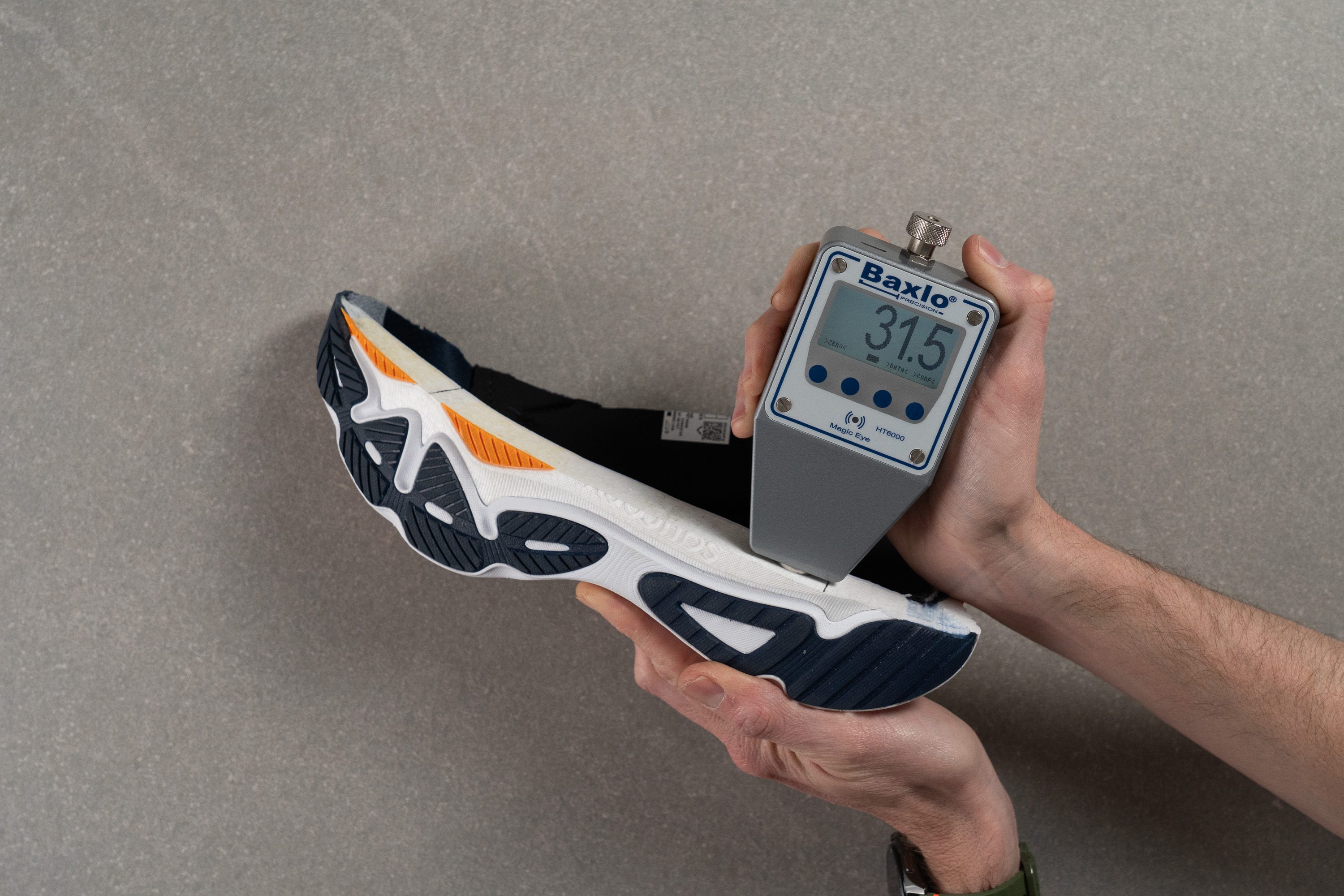
| Hurricane 24 | 31.5 AC |
| Average | 36.4 AC |
Secondary foam
UpdatedWe could have simply mentioned the PWRRUN secondary foam and that would have been just fine, but we’re built differently, so we sliced another section of the Hurricane 24 to get a better look. We discovered that PWRRUN foam wraps around the shoe’s sides, offering extra support with a smart design that helps center your feet on every stride.
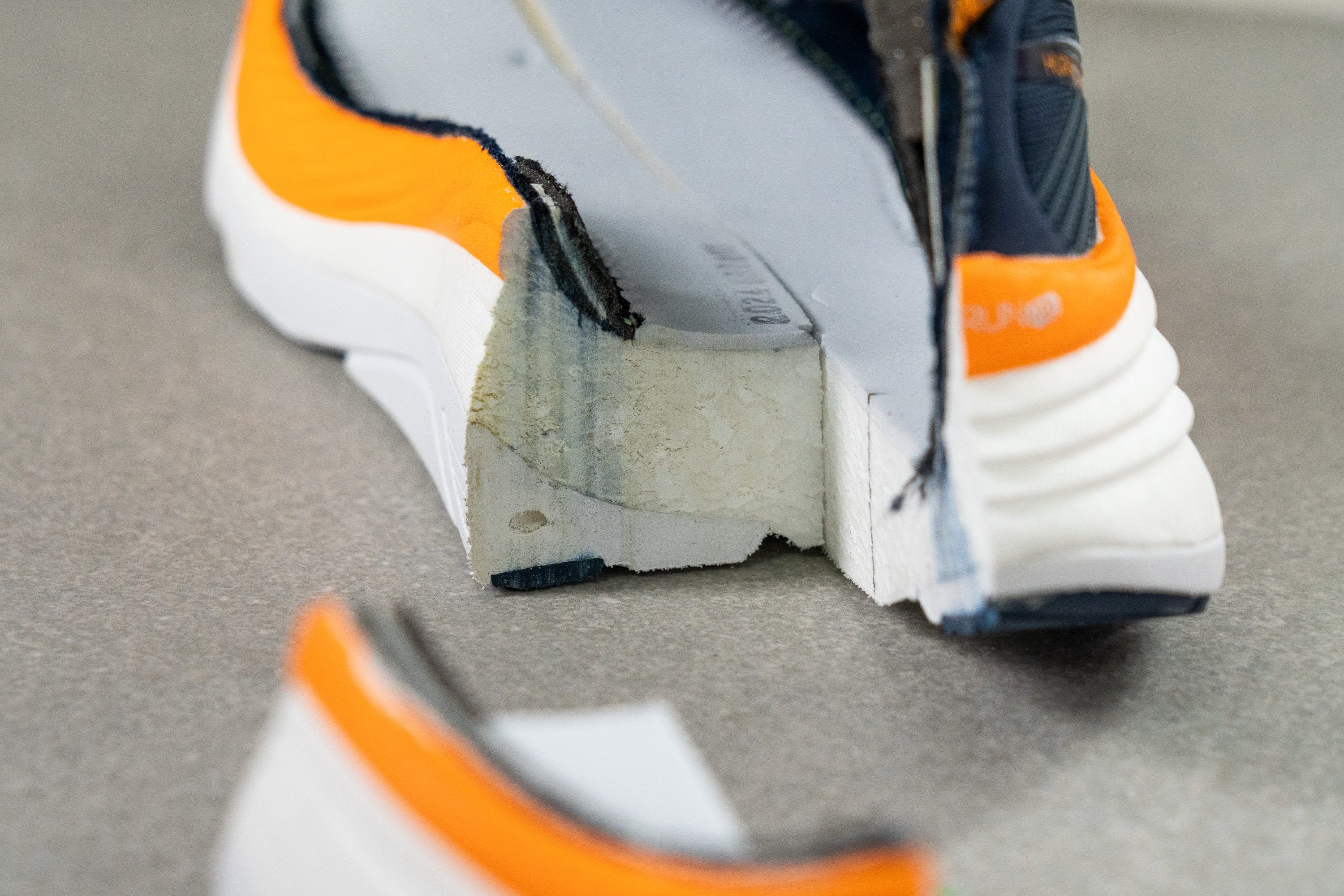
As shown in the photo, the whiter PWRRUN foam cradles the bouncier, pellet-shaped PWRRUN PB, adding stability and durability. We confirmed this with another durometer reading, revealing a much firmer 55.2 AC this time.
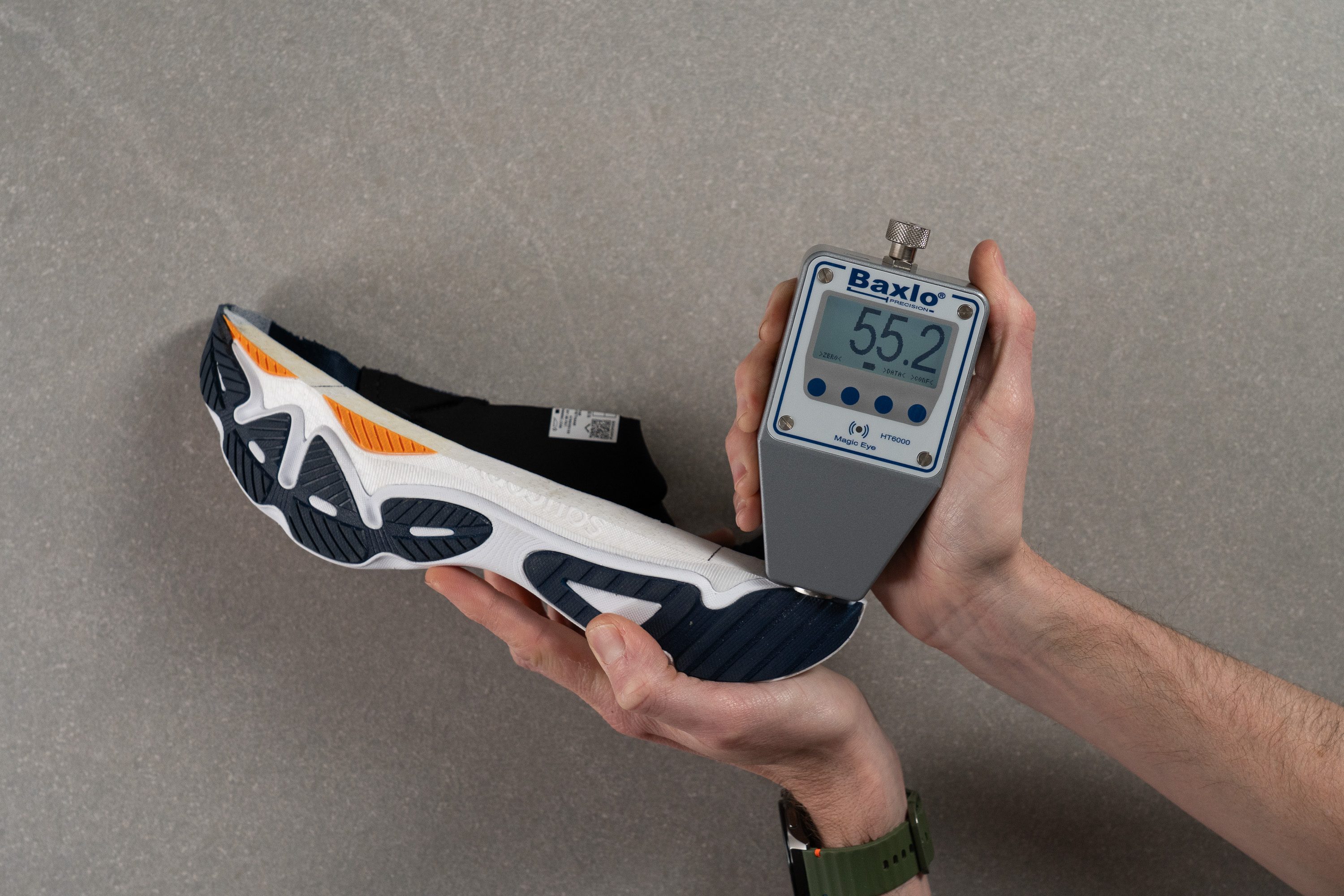
| Hurricane 24 | 55.2 AC |
| Average | 39.1 AC |
Rocker
Lately, we’ve encountered some highly rockered shoes alongside nearly flat silhouettes. The Hurricane 24 masterfully blends the best of both worlds with a late-stage forefoot rocker and a pronounced heel bevel—an especially smart combination for heel strikers navigating the shoe's gargantuan midsole.
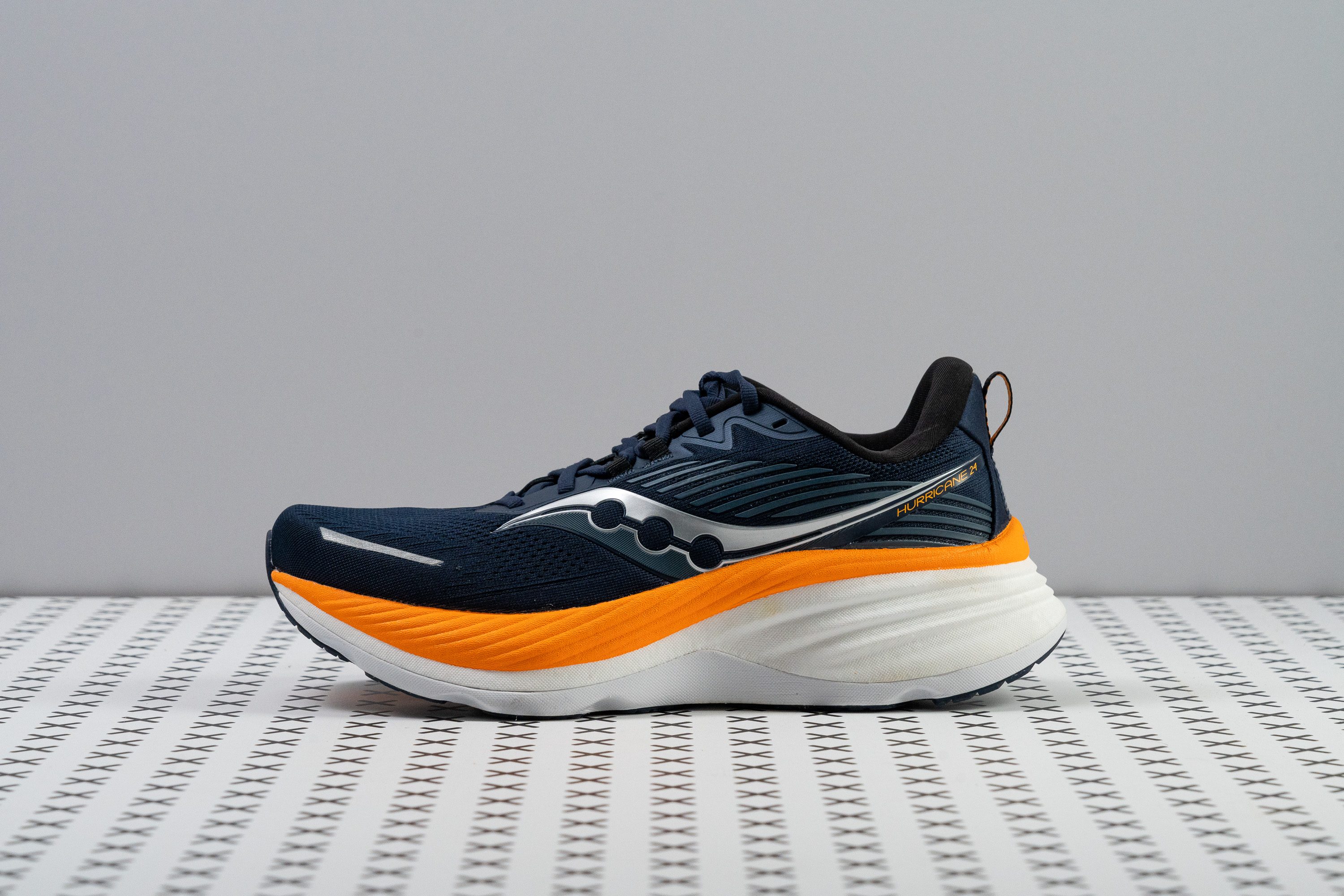
Ultimately, runners can anticipate a ride that feels traditional, yet thoughtfully modernized for smoother transitions, especially for heel strikers.
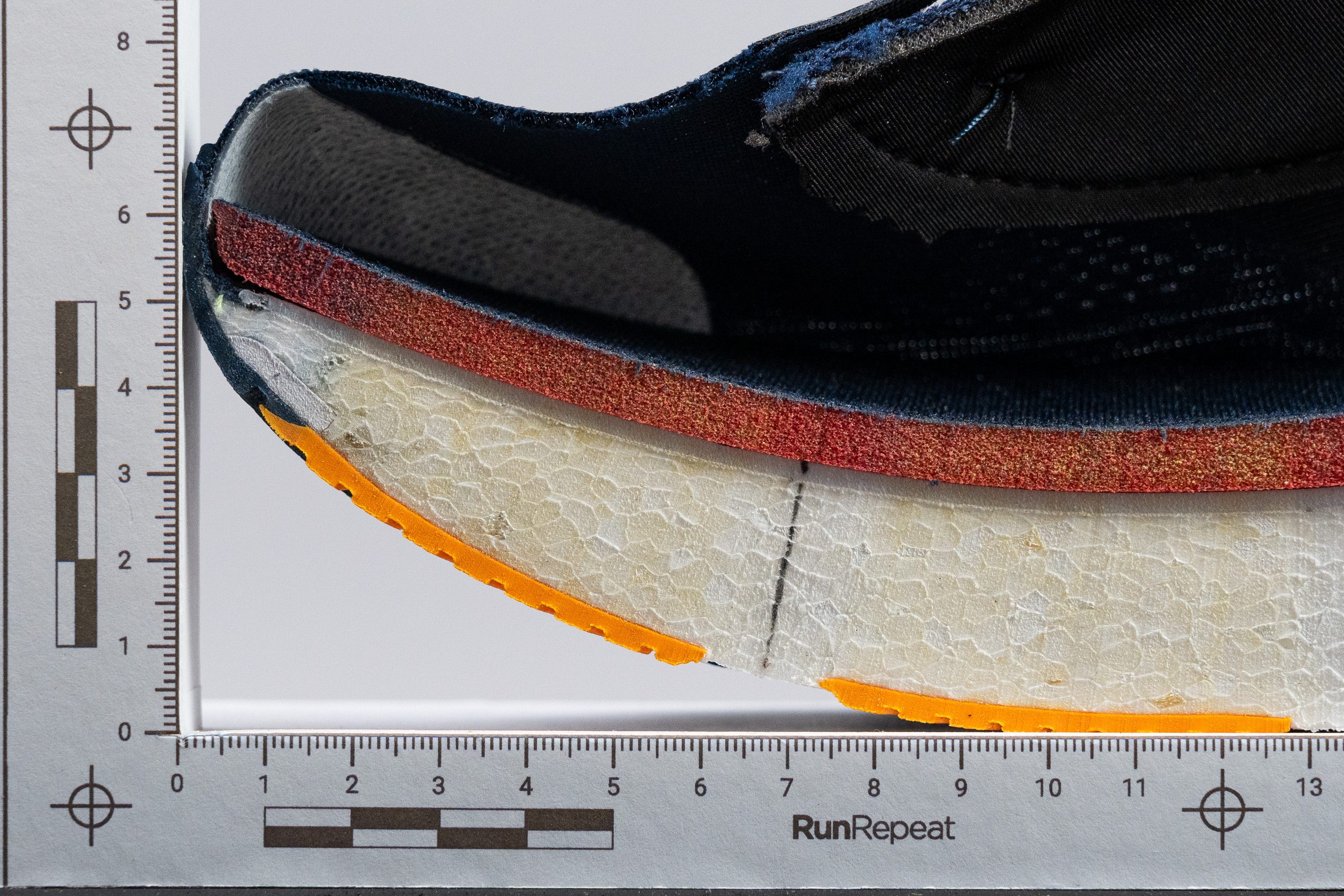
Size and fit
Size
Saucony Hurricane 24 fits slightly small (105 votes).
Internal length
| Hurricane 24 | 271.0 mm |
| Average | 269.4 mm |
Width / Fit
Saucony is shifting toward providing wider fits than 3 or 4 years ago, and we discovered that the Hurricane 24 embraces this trend with a generous 97.9 mm measurement.
This makes it an excellent option for those with slightly wider feet, even in its standard width. Additionally, for those who require even more room, Saucony offers a 2E size in select markets, further catering to a broader range of foot shapes.
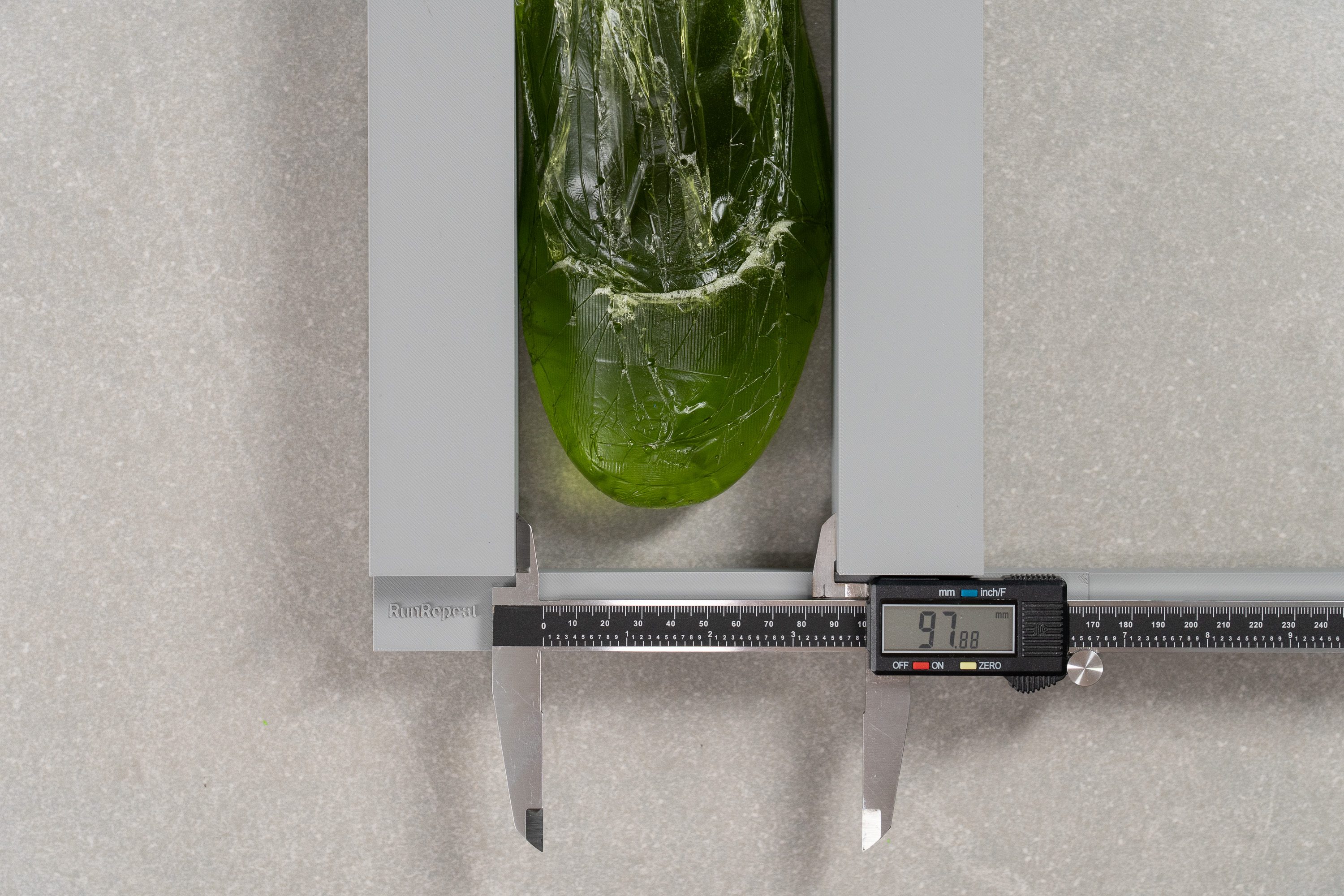
| Hurricane 24 | 97.9 mm |
| Average | 95.1 mm |
Toebox width
If you're a RunRepeat regular, you probably know that we take multiple width measurements since one alone doesn’t provide the complete picture.
Despite being broader than other models from this brand, Saucony stays true to its design philosophy, and the toebox remains tapered. At 73.7 mm, it’s an average design, though we believe a few extra millimeters would have been ideal.
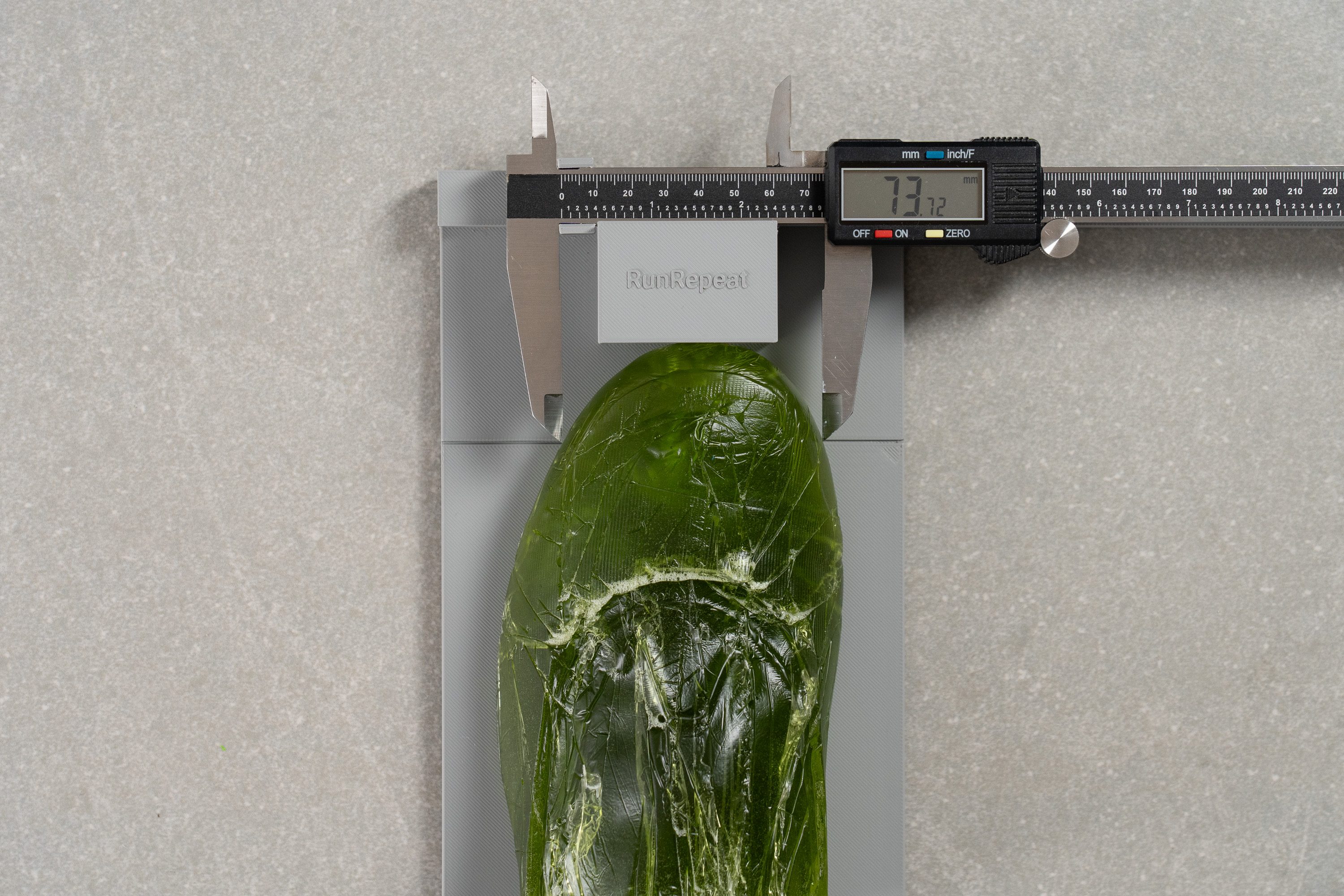
| Hurricane 24 | 73.7 mm |
| Average | 73.3 mm |
Toebox height
In terms of height, there’s adequate volume for upward toe movement, but nothing remarkable.
At 26.6 mm, it’s actually slightly below average compared to most running shoes.
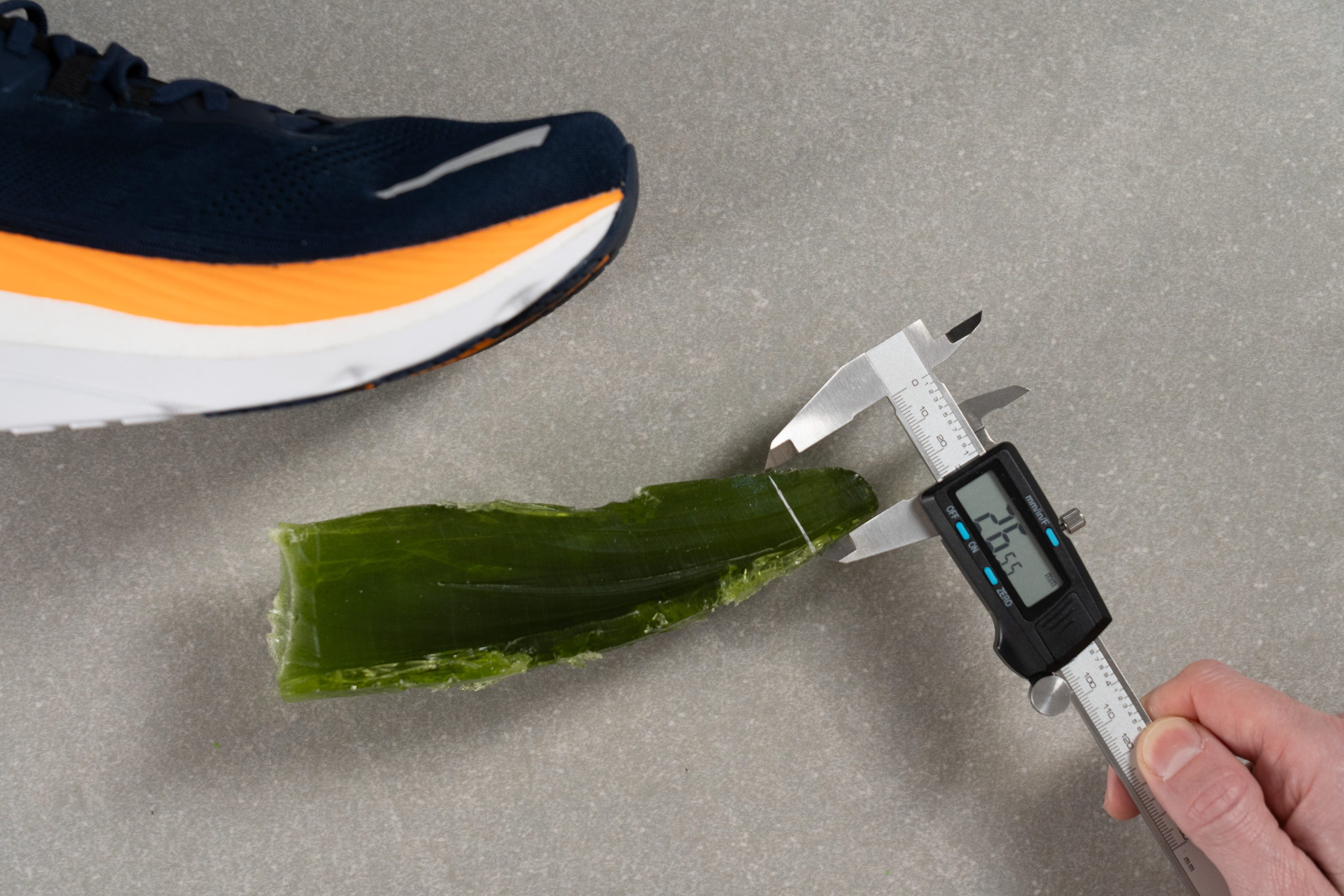
| Hurricane 24 | 26.6 mm |
| Average | 27.0 mm |
Traction / Grip
Traction test
We’re glad to report that the Hurricane 24 offers a grip-ready outsole built to handle most weather scenarios. Whether you're dealing with light snow, slick rain, or dry roads, its 0.49 score confirms dependable all-season traction.
| Hurricane 24 | 0.49 |
| Average | 0.49 |
Outsole design
This outsole combines strategic rubber placement with large exposed foam zones to keep the weight down. High-wear areas like the heel and forefoot are protected, while the midfoot stays open.
However, it was pretty clear that that full rubber coverage wasn't realistic—it would add too much weight.
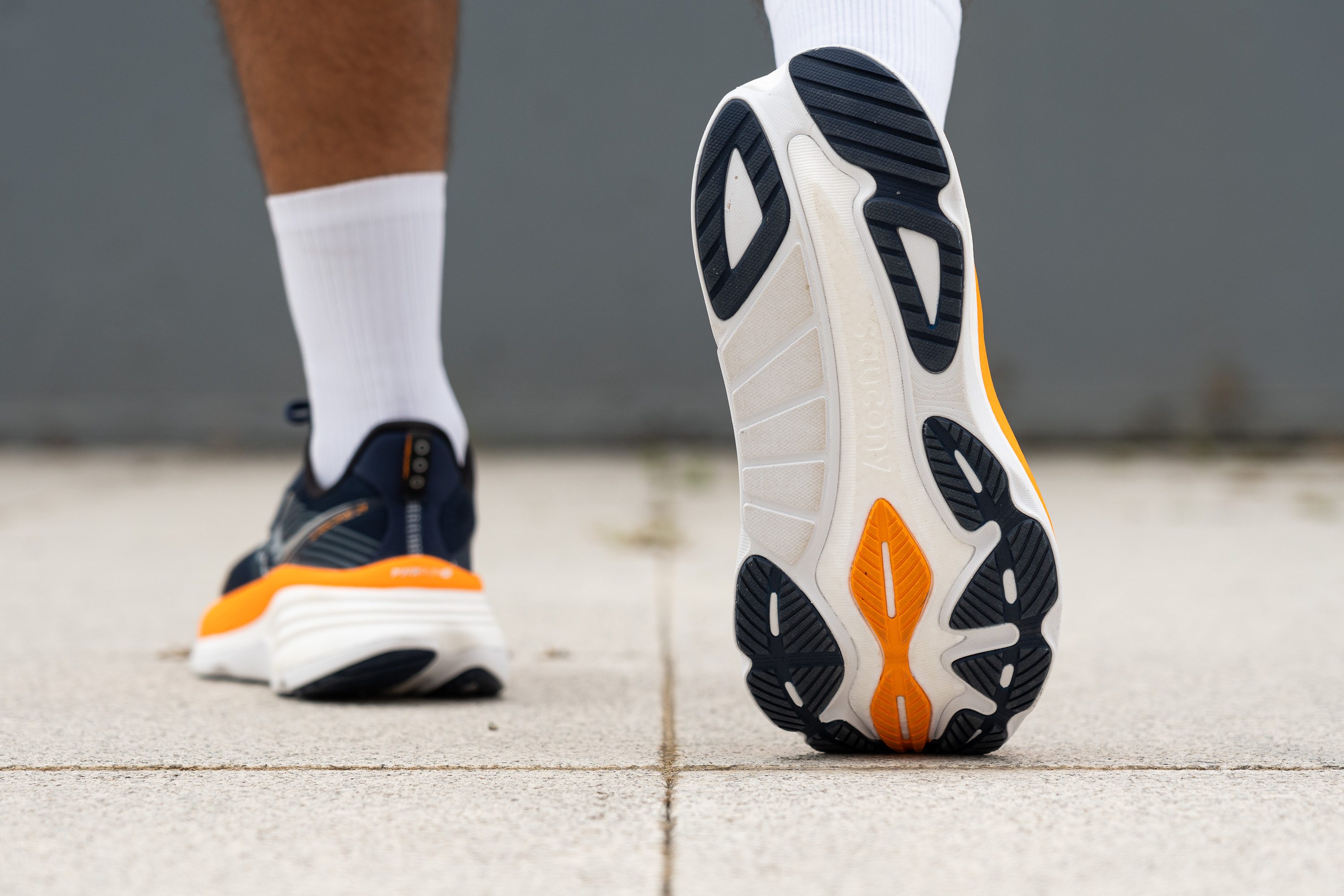
Flexibility / Stiffness
If you're searching for a stable yet flexible shoe, the Hurricane 24 isn't your best option—it registered 17.9N in our 30-degree bend test.
While this isn’t a disaster, it's on the stiffer side compared to other training shoes. If you’re after something more flexible and suitable for daily wear, we recommend sacrificing a bit of stack and opting for a shoe like the ASICS GT 2000 13.
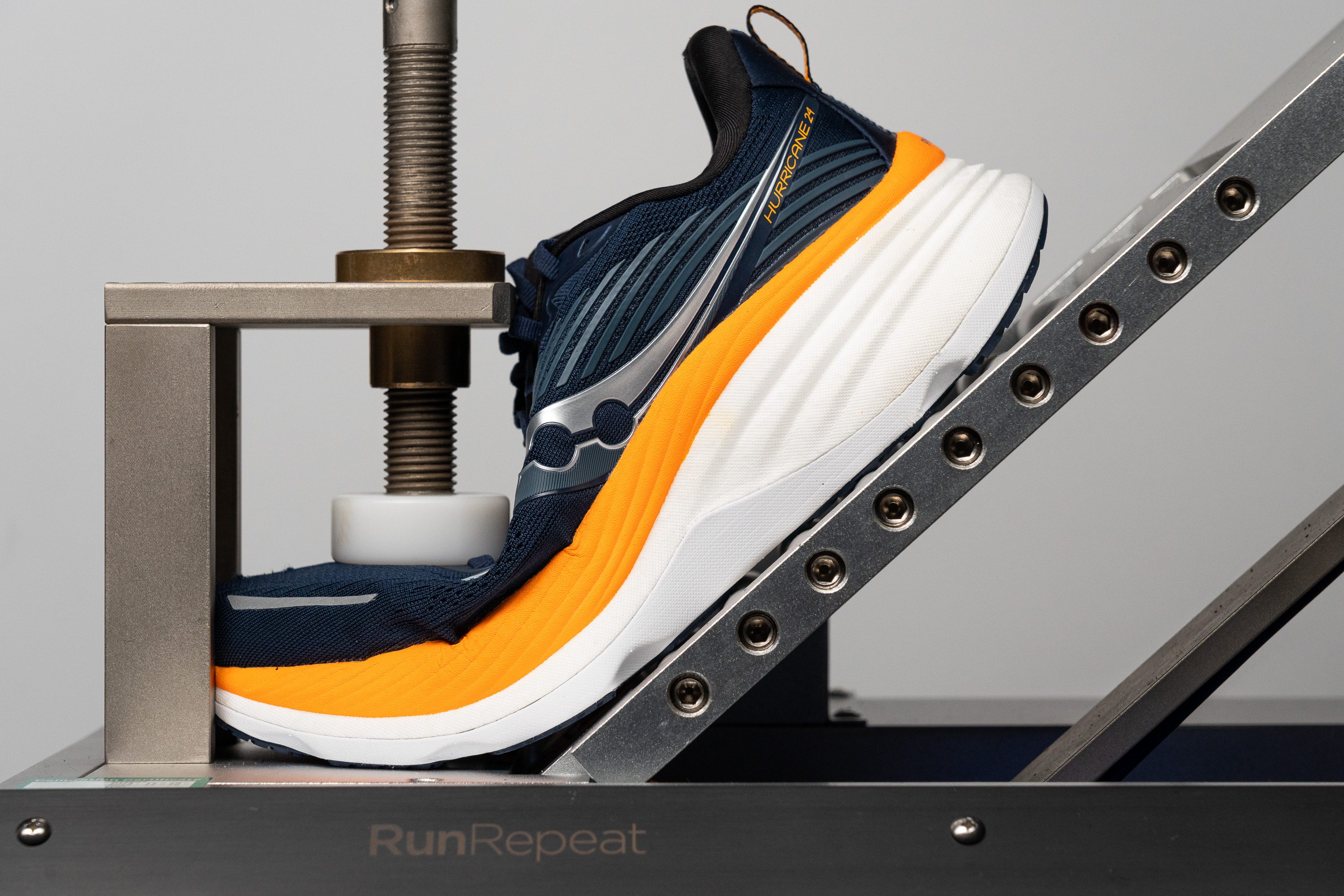
| Hurricane 24 | 17.9N |
| Average | 15.3N |
Weight
When the Hurricane 24 arrived at our lab, we immediately sensed its heft, yet we hoped it would stay under 11 ounces.
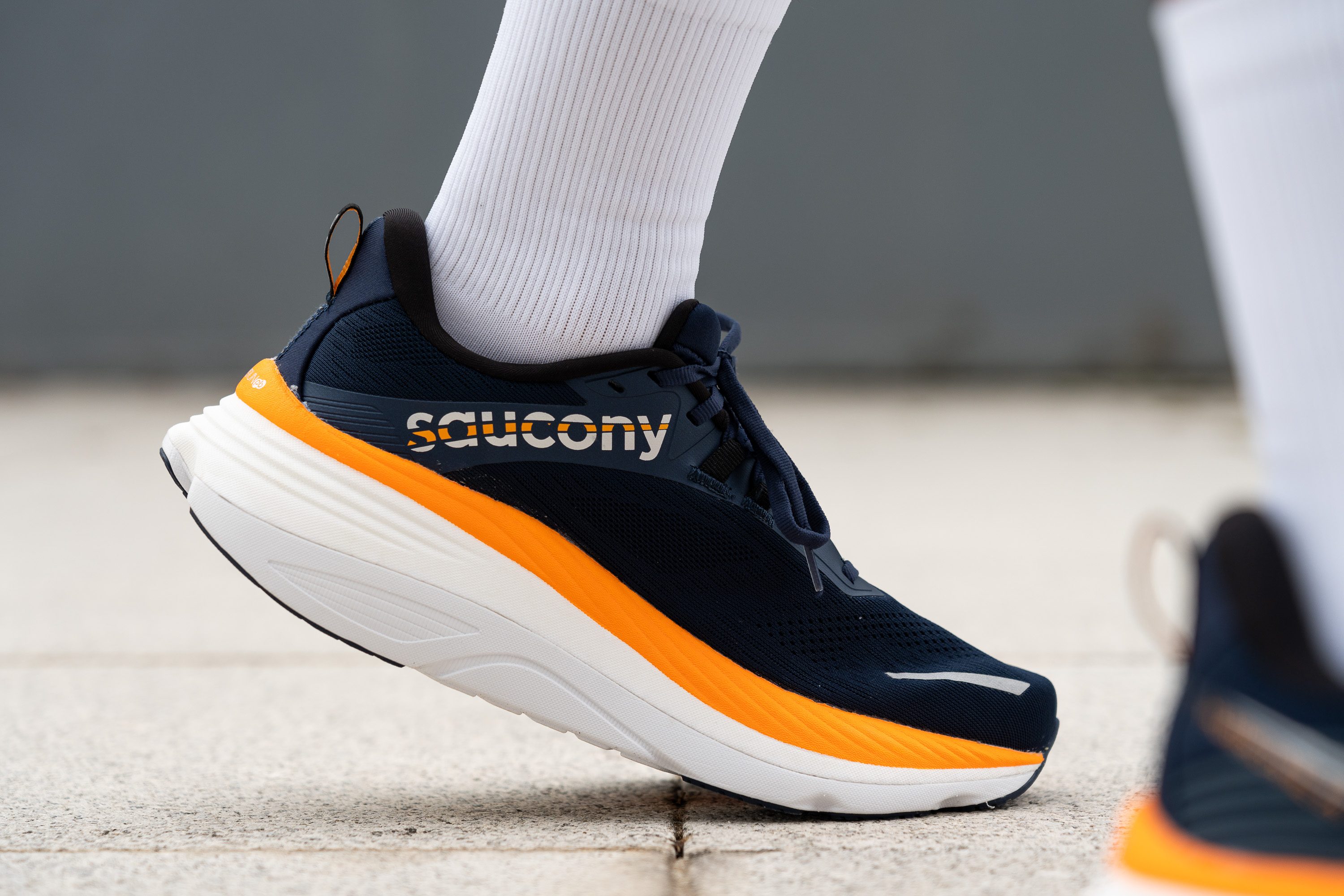
Unfortunately, it weighed in at 11.1 oz or 315g—a disappointing revelation, as other shoes with similar features manage to stay even below 10 ounces. We think that Saucony could shed at least an ounce with some minor tweaks to its design for the next version.
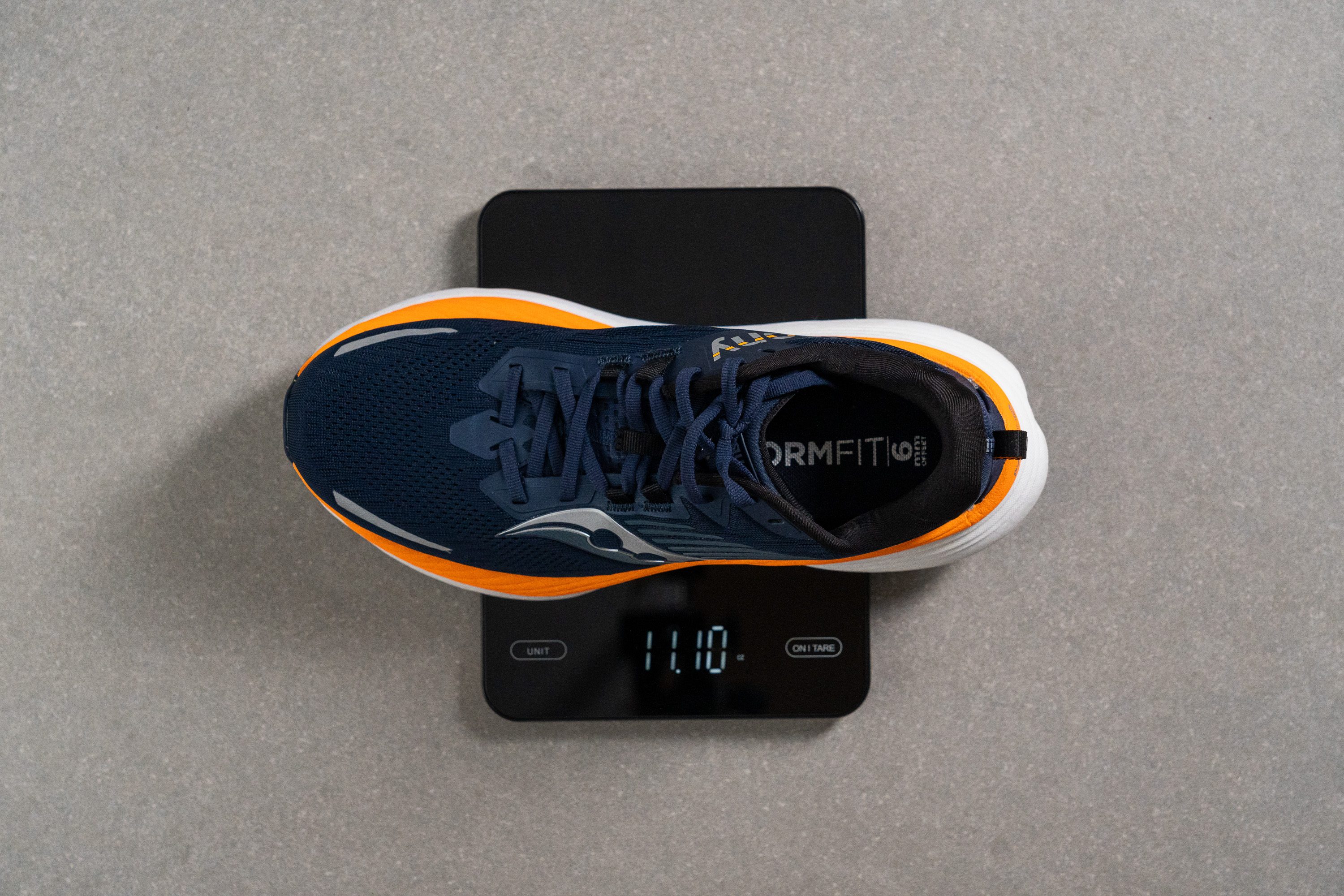
| Hurricane 24 | 11.1 oz (315g) |
| Average | 9.3 oz (264g) |
Breathability
The Saucony Hurricane 24's engineered mesh upper, while maintaining a straightforward design without new innovations, performs exceptionally well in ventilation—earning a perfect 5/5 score in our smoke test. This proves that the toebox is highly effective at expelling heat and moisture.
Shining a light through the upper revealed the transparency of the ventilation holes. Surprisingly, despite the typical thickness in stability shoes, the Hurricane 24's midfoot area is also impressively breathable.
Our detailed microscope examination confirmed that the mesh used in the Hurricane 24 is of the standard variety commonly found in many running shoes.
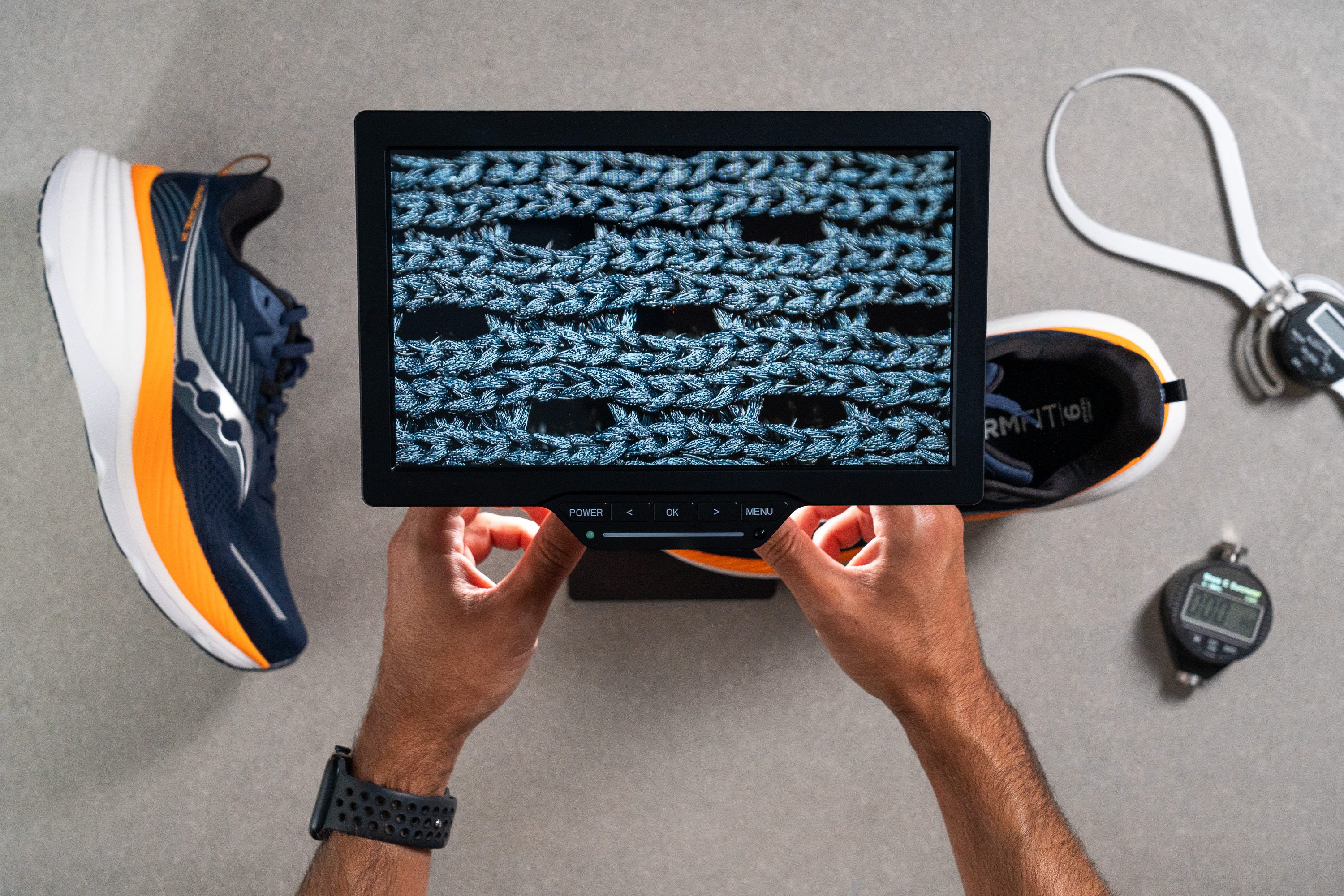
This mesh is equipped with numerous ventilation holes strategically placed to optimize airflow. These holes efficiently facilitate air circulation, ensuring that the shoe remains breathable even under hot conditions.
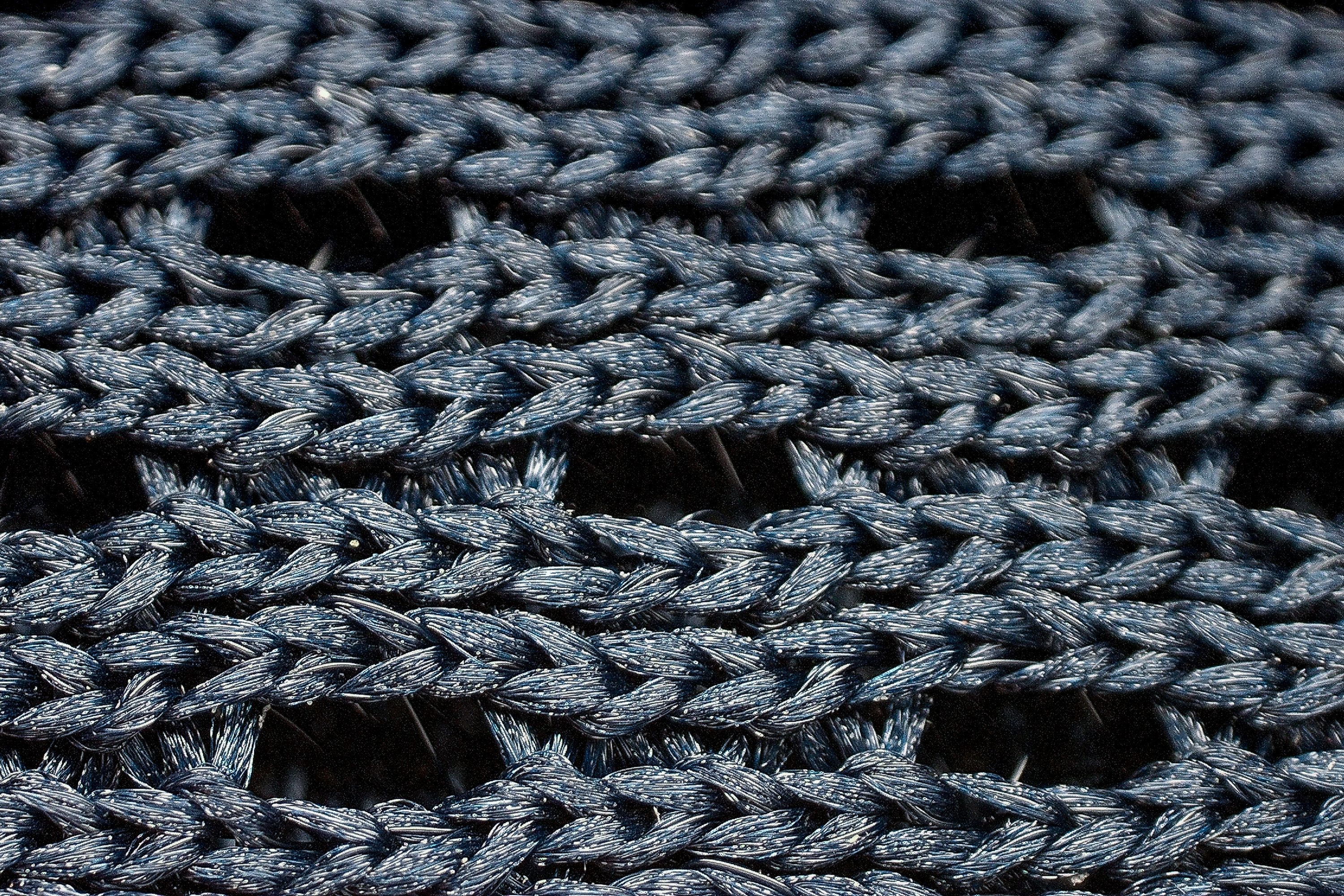
The material of the upper is slightly elastic, which contributes to a more customized fit by conforming to the shape of the foot without causing any constriction. And more importantly, it is completely free of any rough parts or potentially irritating seams, enhancing the overall comfort of the shoe.
Overall, the construction of the Hurricane 24's upper is well-executed. However, despite its solid appearance and feel, we need to conduct further testing to assess its long-term durability.
| Hurricane 24 | 5 |
| Average | 3.7 |
Stability
Lateral stability test
The Hurricane 24 sets itself apart from the Triumph series by offering superior support, which justifies its extra weight.
We tested it extensively and found it to be incredibly supportive during runs. This stability is largely due to Saucony's CenterPath technology—a combination of raised midsole sidewalls, a broadened sole, and mild guidance elements that help center the ride and prevent lateral collapsing. And in our experience using the Hurricane 24, these features work exceptionally well.
Torsional rigidity
The Hurricane 24 doesn't have a nylon or carbon plate. We believe this is a wise decision, as adding more stiffness could have detracted from the shoe's comfort.
However, despite lacking a plate, the Hurricane 24 is far from flexible. Its substantial stack height contributes to its rigidity, which we confirmed through our twist resistance test, where it scored a 4 out of 5.
| Hurricane 24 | 4 |
| Average | 3.5 |
Heel counter stiffness
The heel counter is slightly stiff but noticeably more flexible than others in the stability category at 3/5. This balanced design choice really paid off—we found during our runs that the heel counter delivers enough support without significantly sacrificing comfort.
| Hurricane 24 | 3 |
| Average | 2.9 |
Midsole width - forefoot
Now, let's dive into one of the standout features of the Hurricane 24—the incredible size of its midsole. It's truly jaw-dropping, almost like the footwear equivalent of a Hummer SUV!
In the forefoot, we measured a whopping 127.9 mm, making it the widest shoe we've ever tested in the lab at the time of this review, and after more than 300 running shoes. Even if you’re reading this a year or two down the line, we estimate that only a handful of shoes might surpass these massive dimensions.
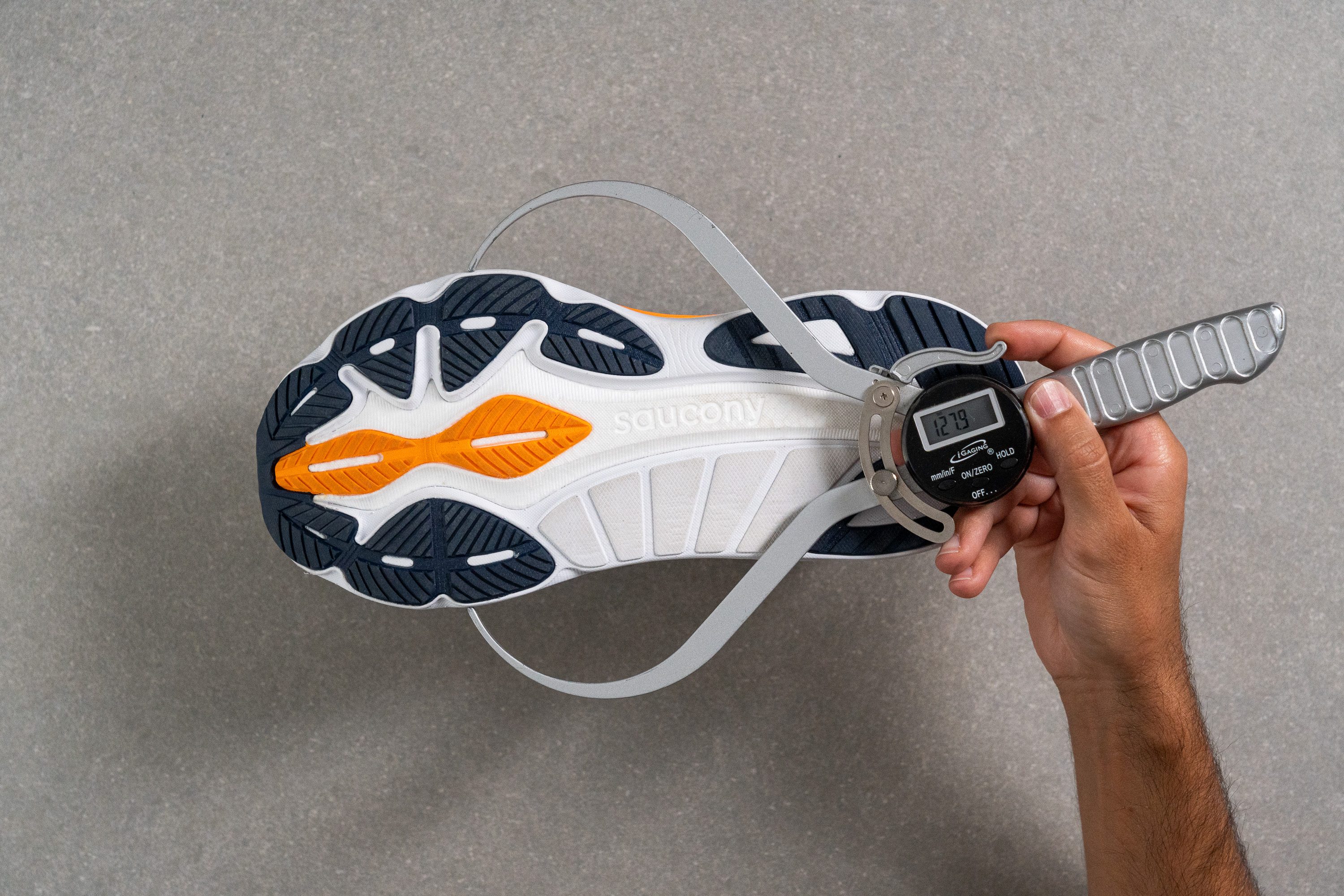
| Hurricane 24 | 127.9 mm |
| Average | 114.4 mm |
Midsole width - heel
The heel didn’t break any records in our lab—Hoka's Gaviota 5 still holds that title for now—but it came close, measuring 103.1 mm with our digital calipers.
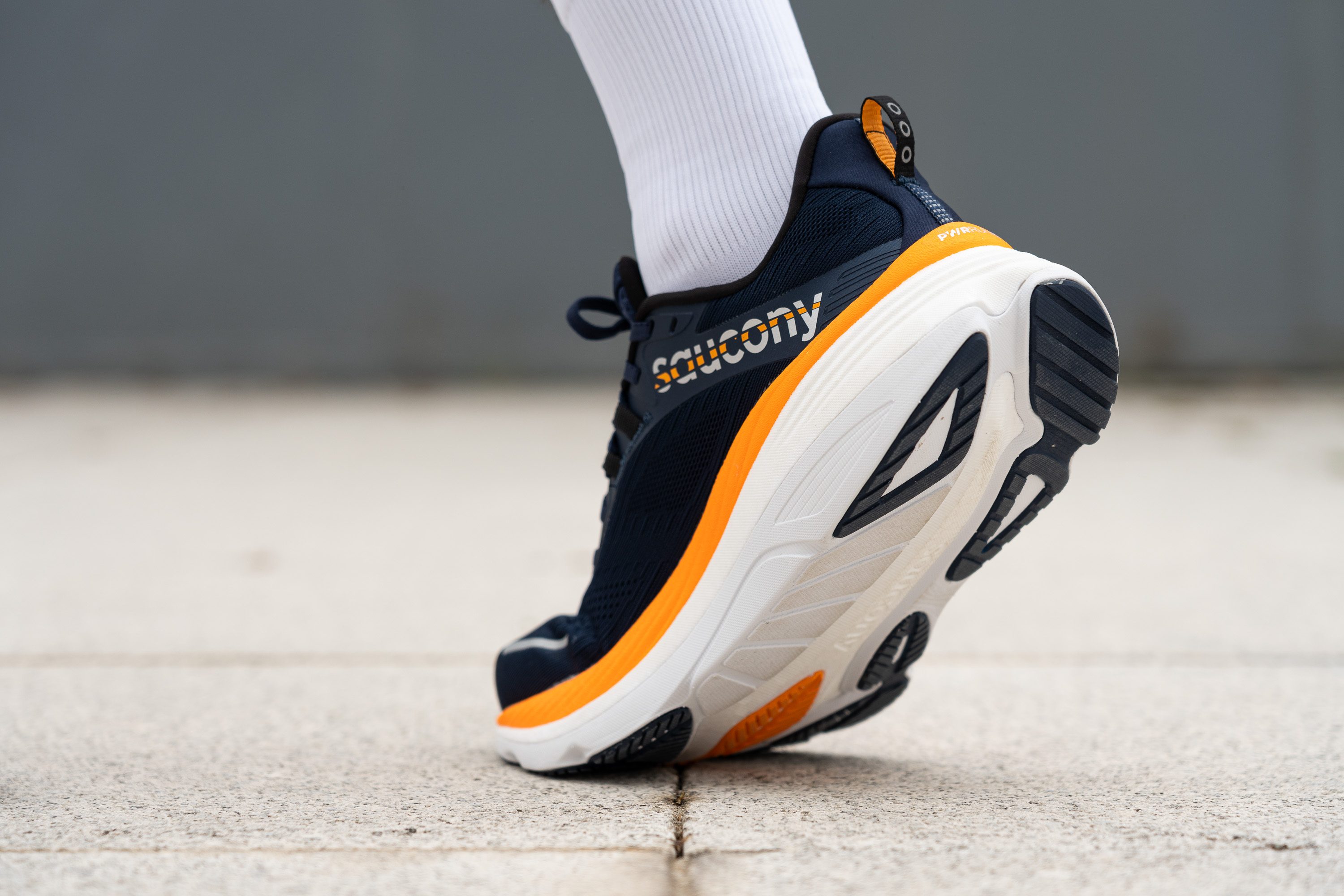
From these measurements, it’s clear that Saucony aimed for maximum width to build inherent support, allowing them to avoid traditional and uncomfortable stability methods. However, this design choice also impacts agility—the shoe feels anything but nimble at any pace.
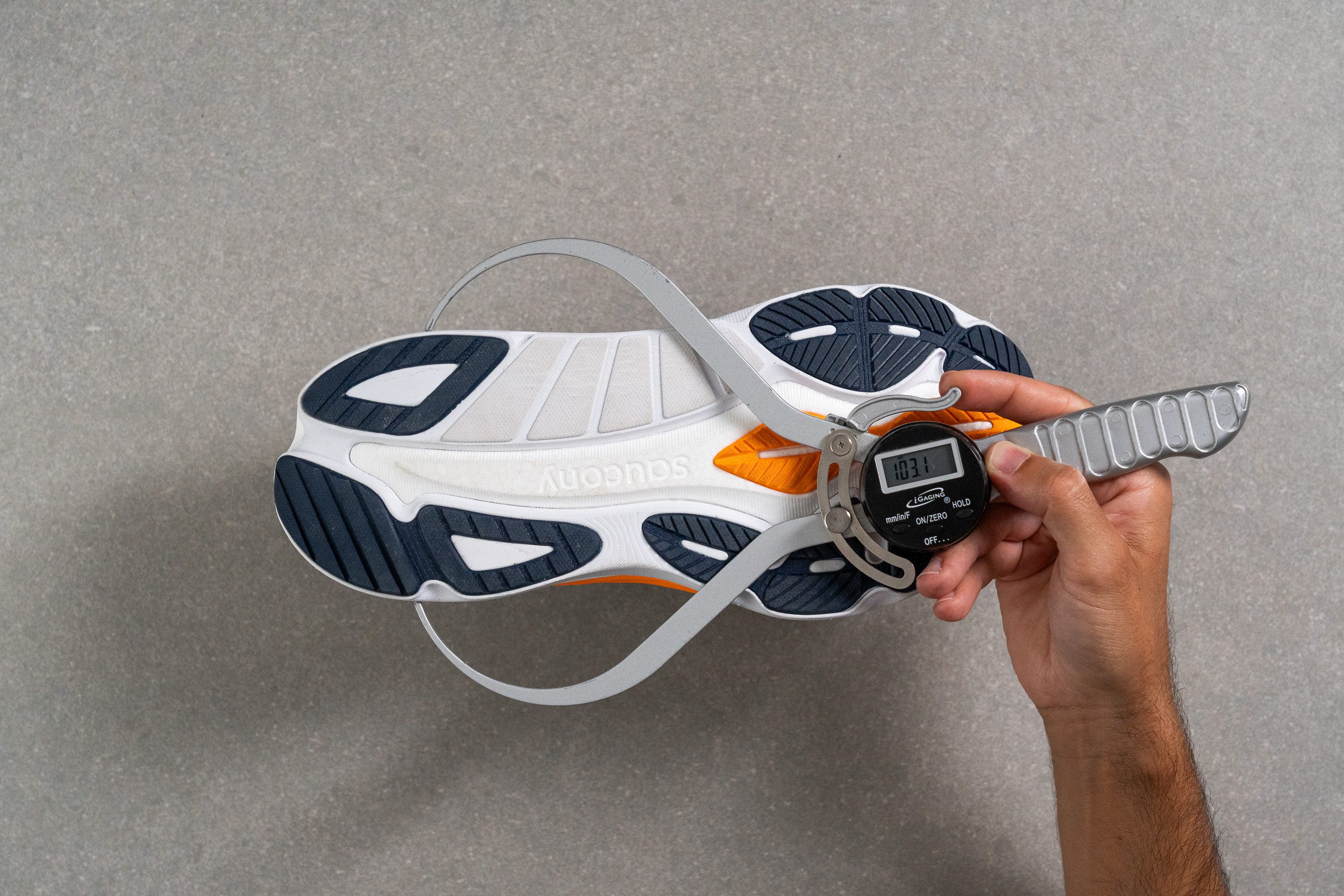
| Hurricane 24 | 103.1 mm |
| Average | 90.6 mm |
Durability
Toebox durability
And here we go! We kicked off our durability tests with the toebox of the upper, and unfortunately, the results were disappointing. As soon as we applied the Dremel tool, the mesh succumbed dramatically.
We discovered a substantial hole from just a brief contact with the sandpaper tip—a clear indicator of poor durability. This failure earns the H24 a dismal rating of 1 out of 5 in our first durability assessment.
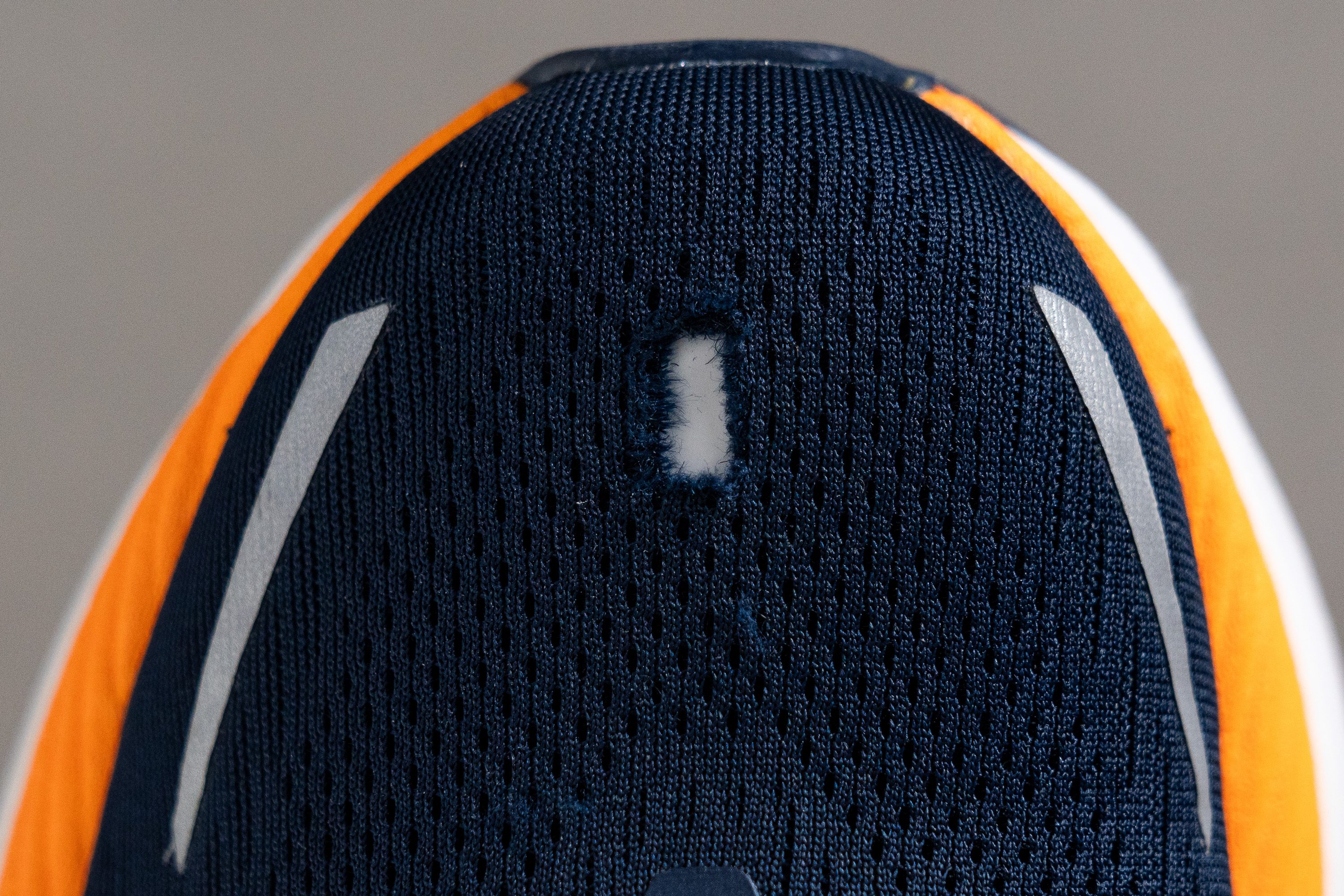
| Hurricane 24 | 1 |
| Average | 2.6 |
Heel padding durability
We held out hope for a better outcome in our second test, yet the results barely improved, as we got a 2 out of 5 after examining the damage.
This performance is clearly inadequate and demands significant enhancements in future iterations of the Hurricane.
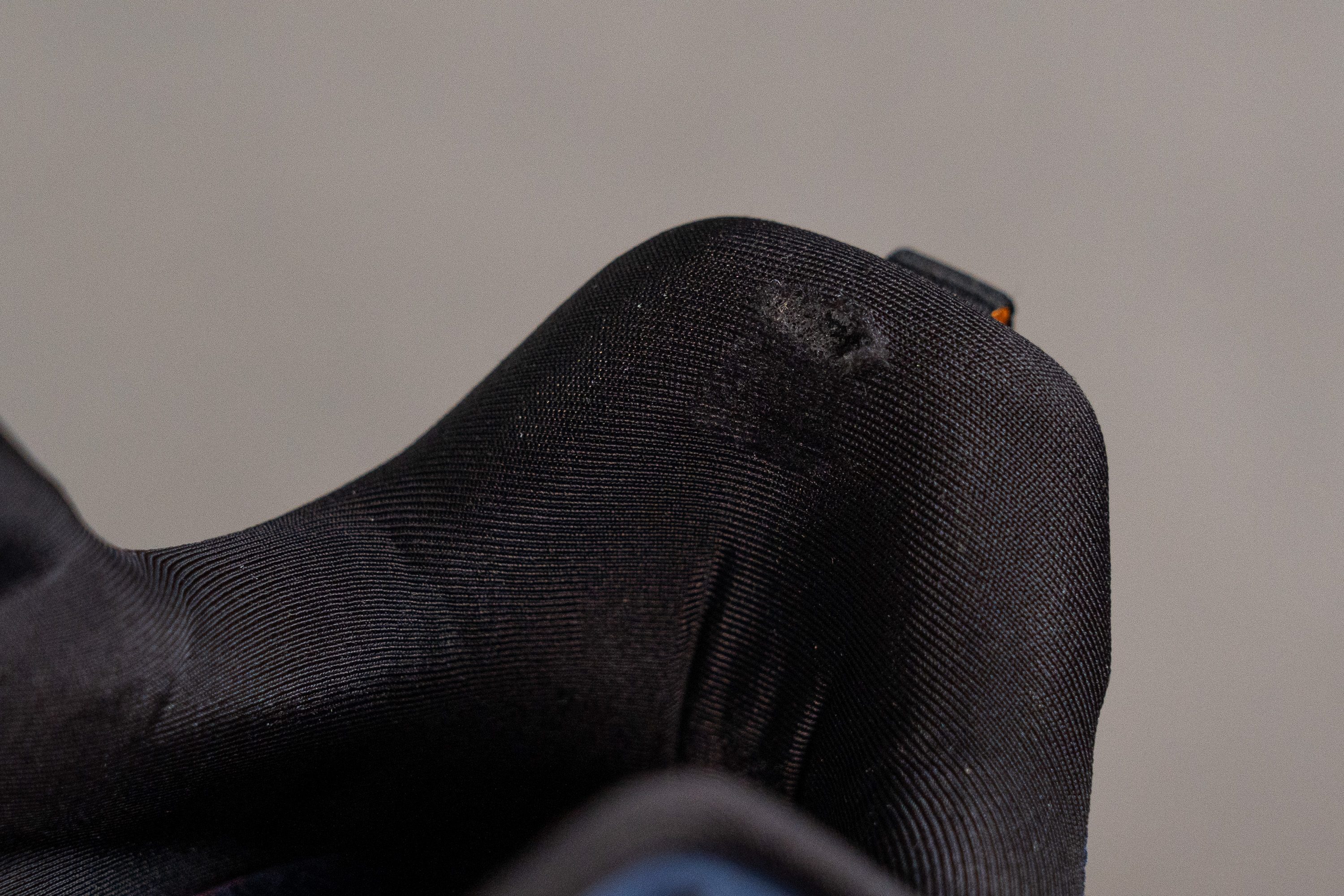
| Hurricane 24 | 2 |
| Average | 3.4 |
Outsole durability
Our Dremel was on a roll, aiming for a hat-trick in testing durability with the Hurricane 24.
Fortunately, the outsole held up much better than the upper—our tests revealed only 1.0 mm of damage. This is a standard result that shouldn't raise any concerns.
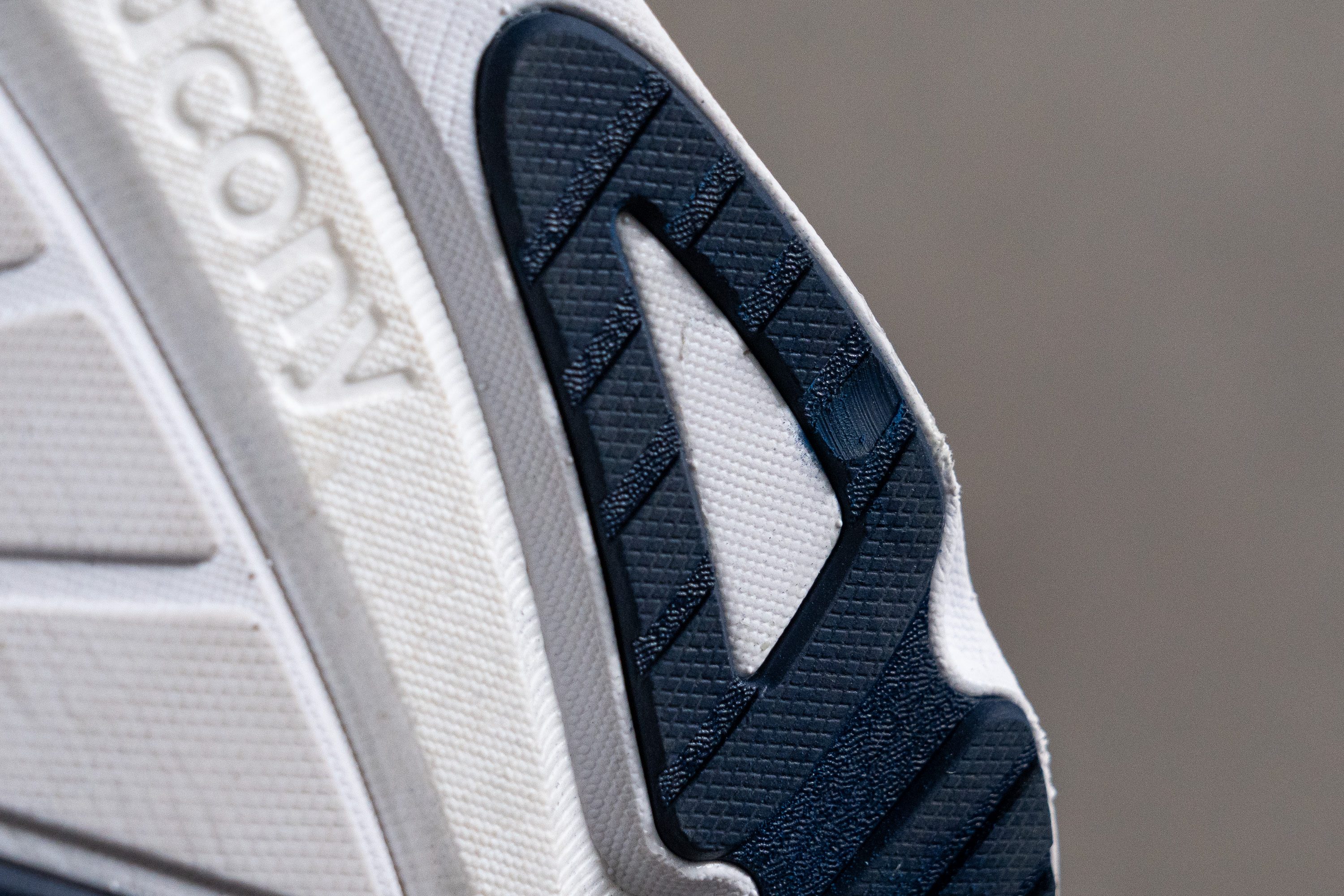
| Hurricane 24 | 1.0 mm |
| Average | 1.1 mm |
Outsole thickness
Given the substantial 2.8 mm thickness of the rubber, we're really optimistic about its durability, especially for heel strikers who often exhibit significant pronation.
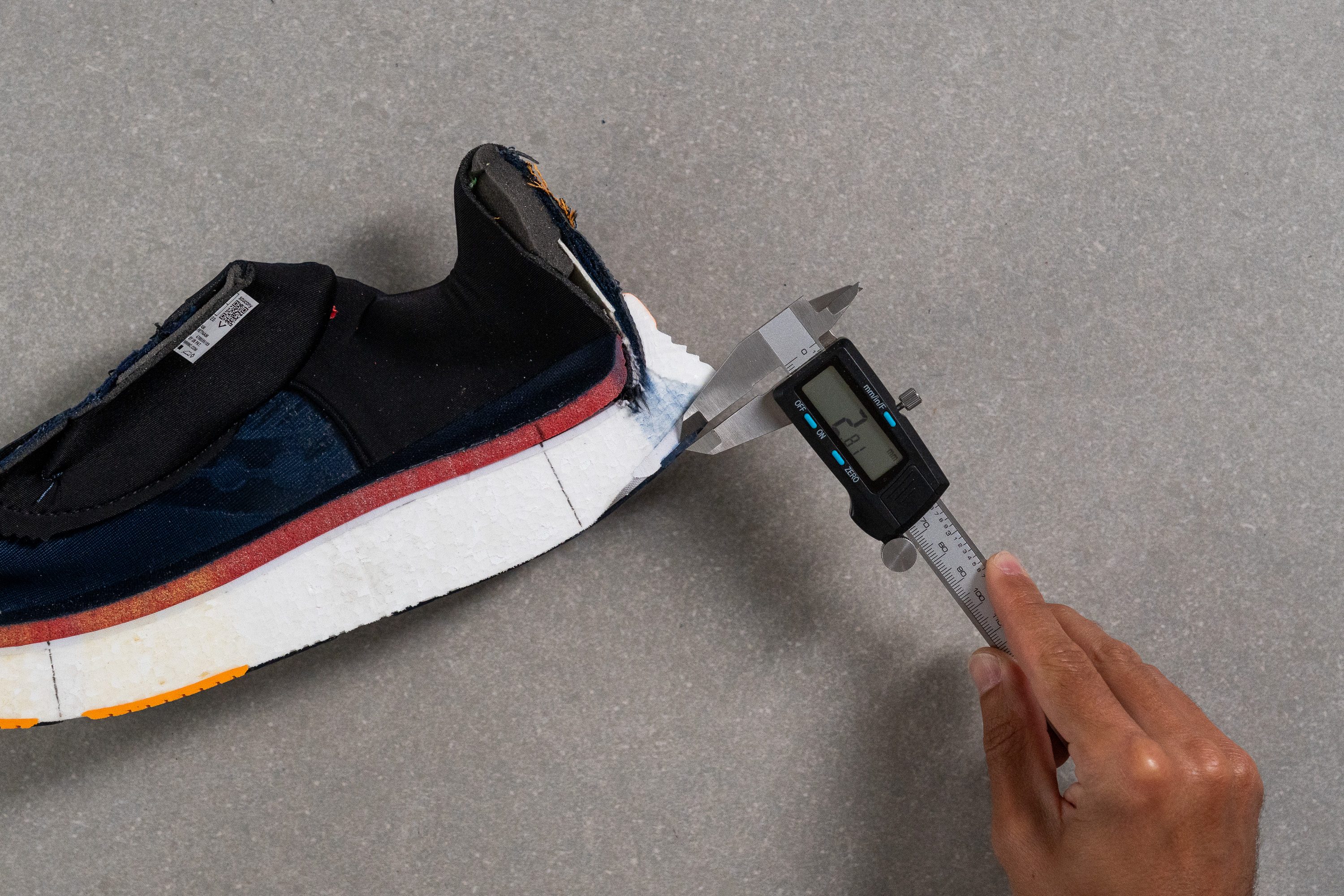
| Hurricane 24 | 2.8 mm |
| Average | 3.2 mm |
Misc
Insole thickness
Saucony is known here in the lab for its ultra-thick insoles, and the Hurricane 24 continues this tradition with a plush 6.7-mm footbed.
While this thick insole contributes to immediate comfort, we were somewhat disappointed not to find a PWRRUN+ insole like in other Saucony models—instead, a standard EVA material is used, which felt like a downgrade.
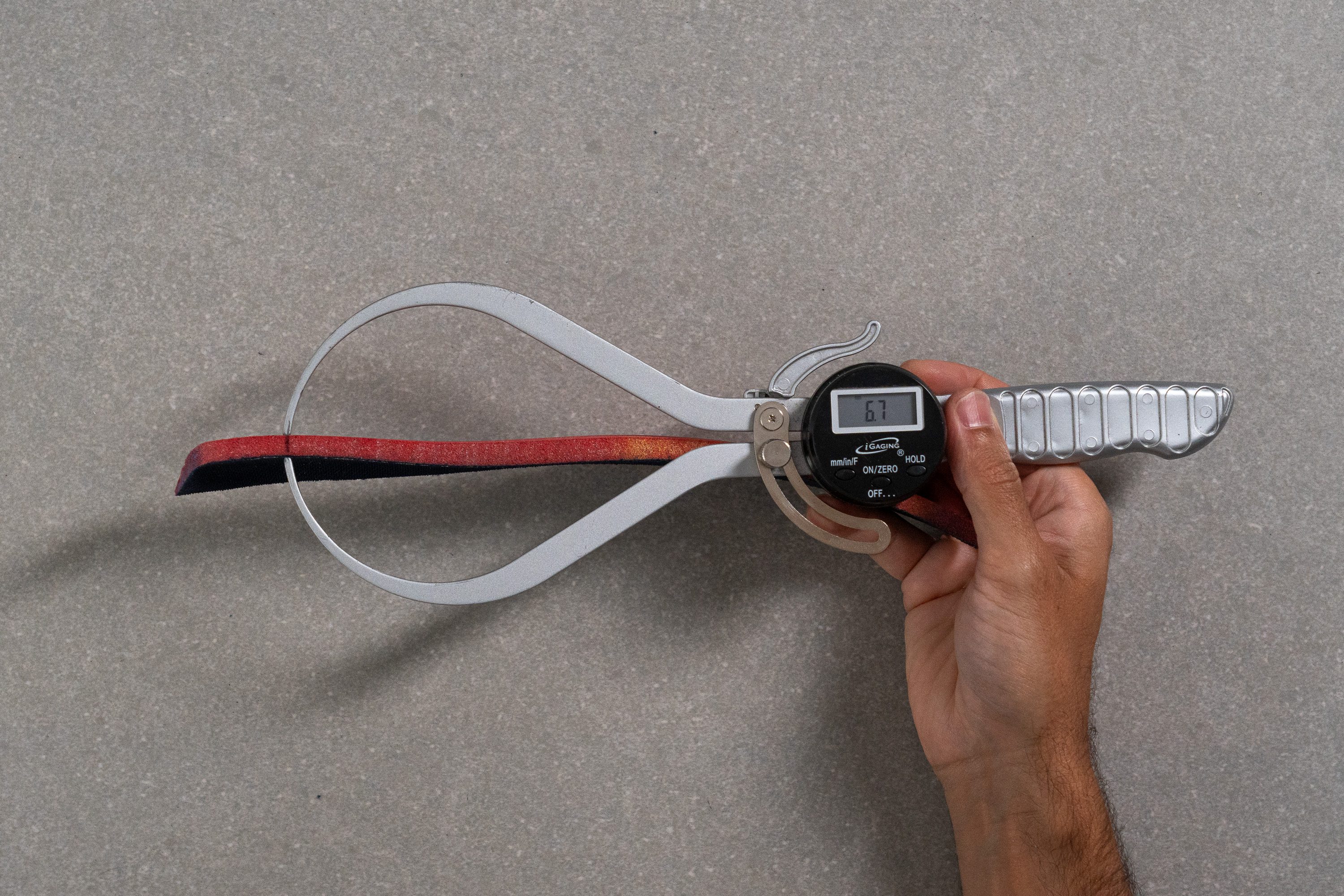
| Hurricane 24 | 6.7 mm |
| Average | 4.5 mm |
Removable insole
You can easily swap the insole with another one if you need more room inside the shoe, and we even think it’s a smart move for some. We explained previously that the stock insole is quite thick, so replacing it with another footbed creates extra volume, giving your foot more space.
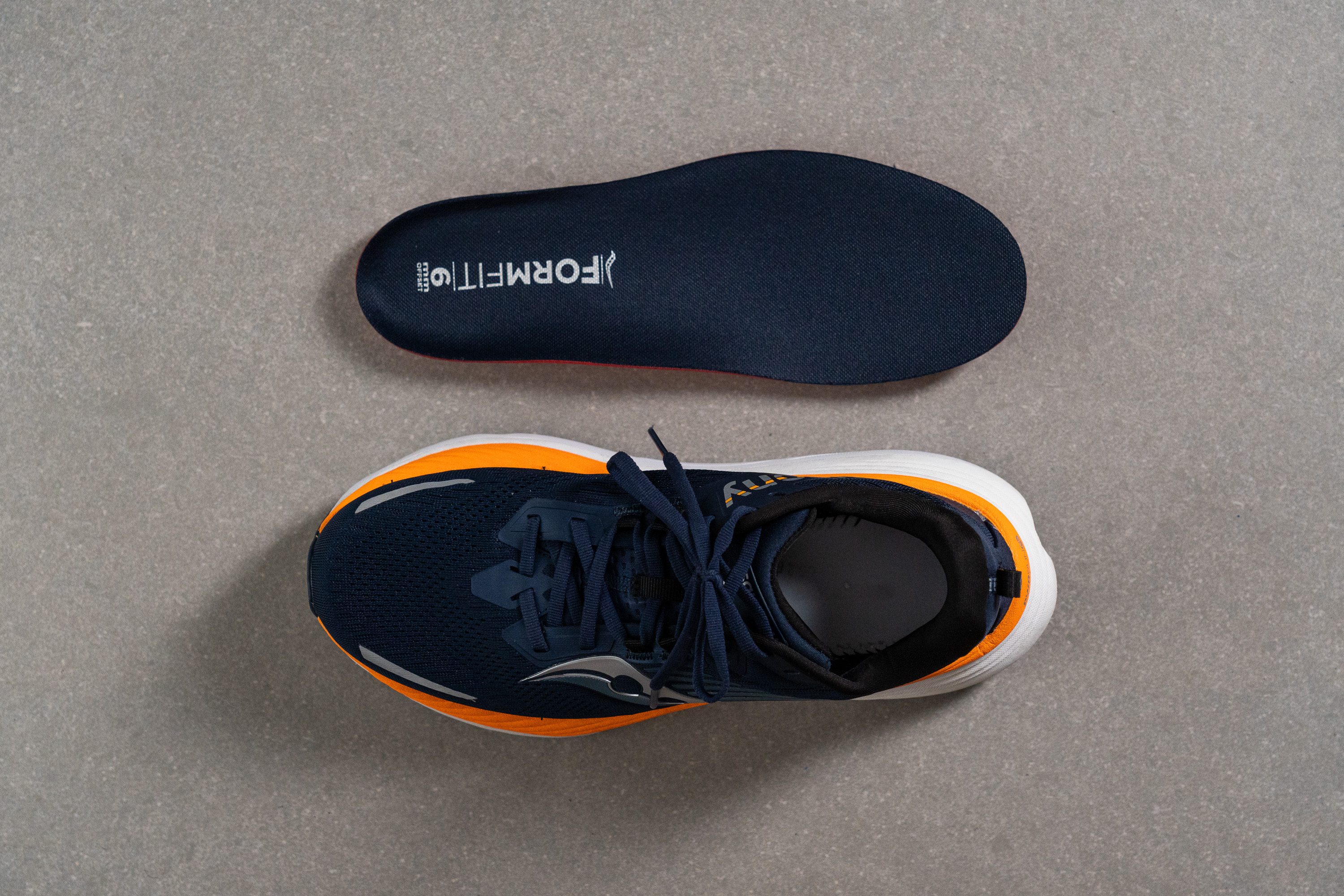
| Hurricane 24 | Yes |
Midsole softness in cold (%)
After subjecting the shoe to 20 minutes in the freezer, we discovered a significant hardening of the PWRRUN PB foam—increasing in firmness by 37%. This result was somewhat surprising for us!
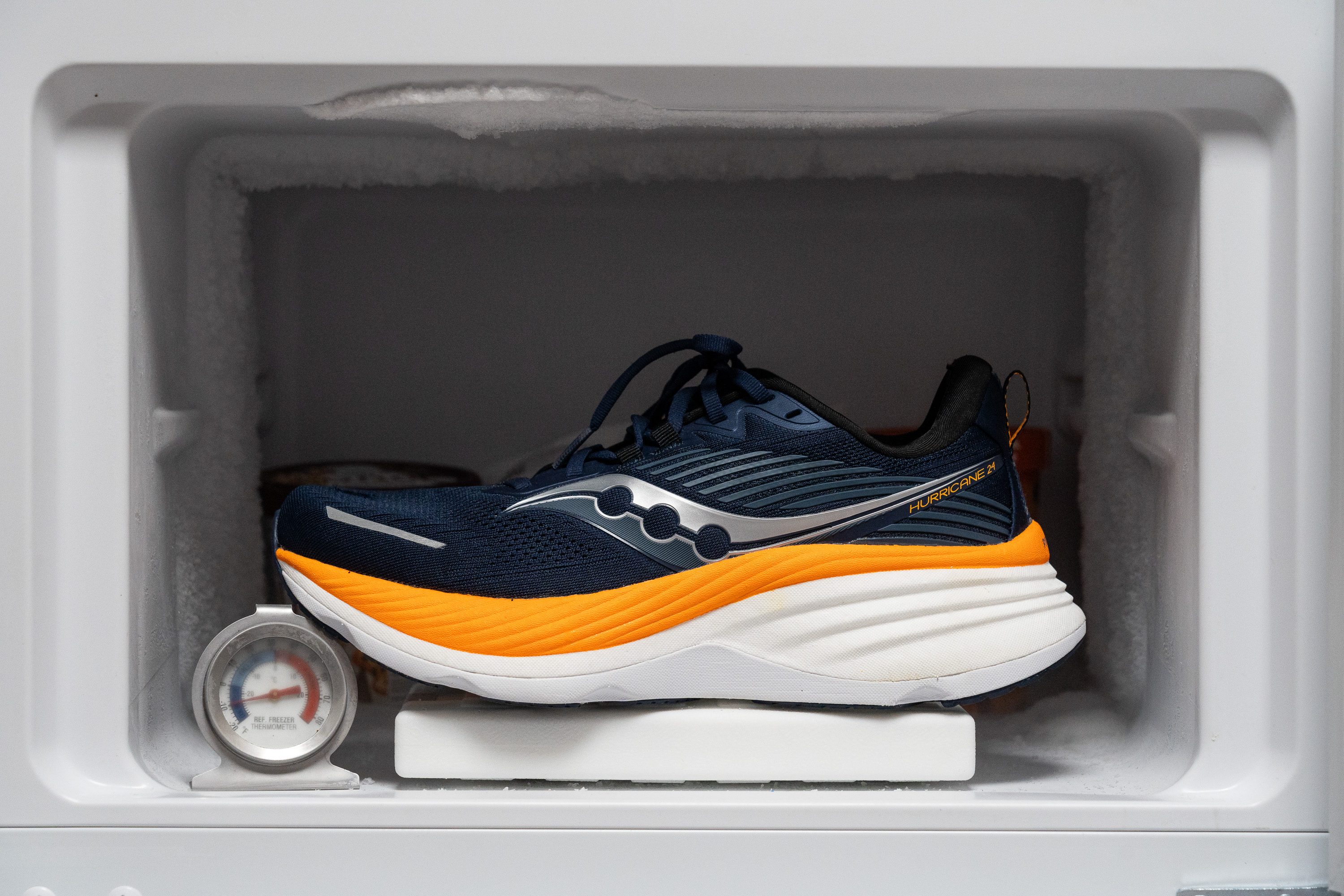
| Hurricane 24 | 37% |
| Average | 24% |
Reflective elements
We were pleasantly surprised to discover reflective elements all around the Hurricane 24, which is something we don’t often encounter in the lab.
In fact, it’s extremely rare to find multiple reflective pieces instead of just one, and we think that this cool design greatly enhances safety for those who need to run at night!
| Hurricane 24 | Yes |
Tongue padding
It's hard to call an upper luxurious without a properly padded tongue, and we found that the Hurricane 24 definitely belongs in that category with its plush 8.4-mm tongue.
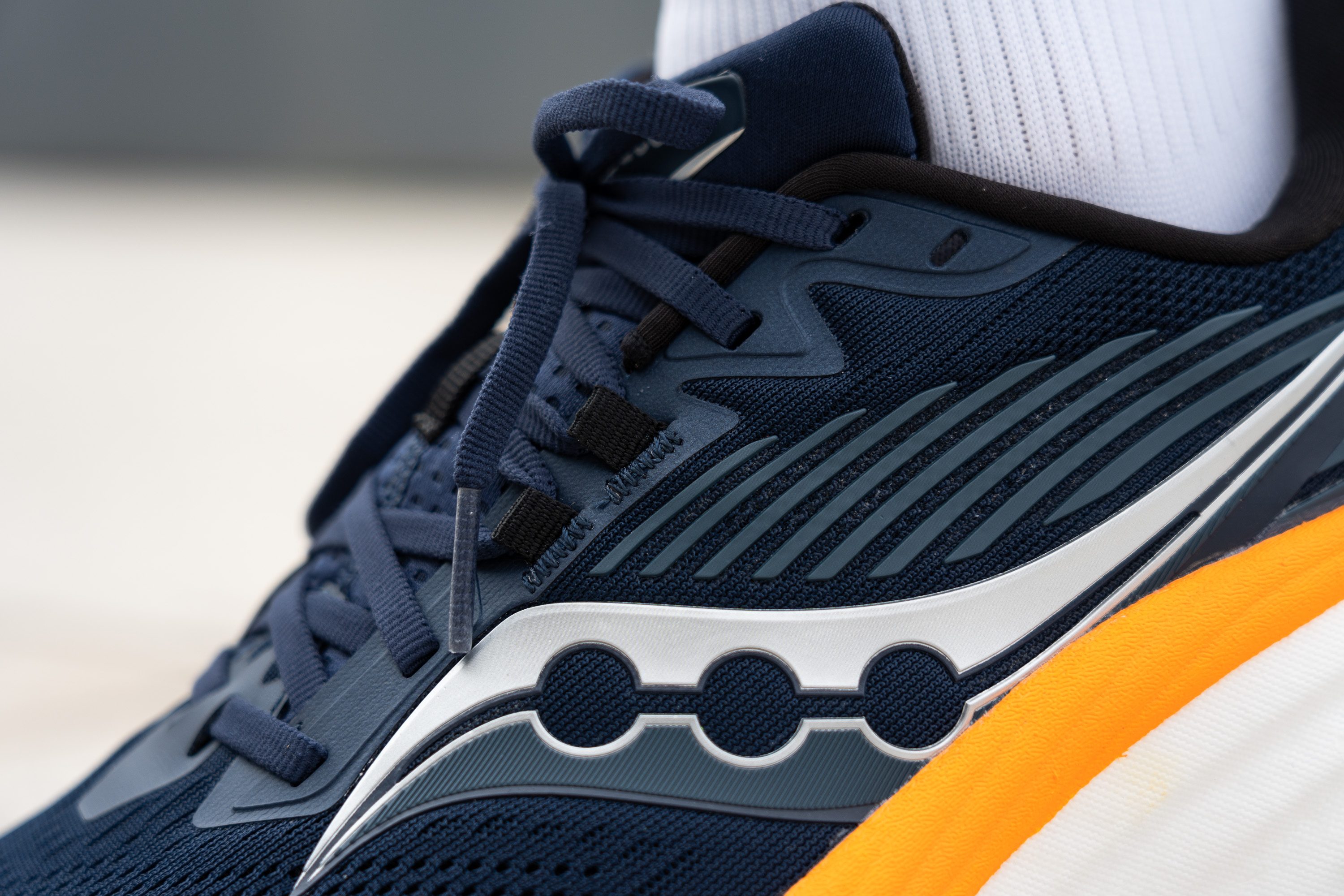
The lacing system combines punched eyelets with two loops, and while we typically prefer a simpler setup, we found that it works smoothly and provides a secure fit, with the flat laces sliding smoothly. Plus, it includes an extra eyelet for those seeking an even more locked-in feel.
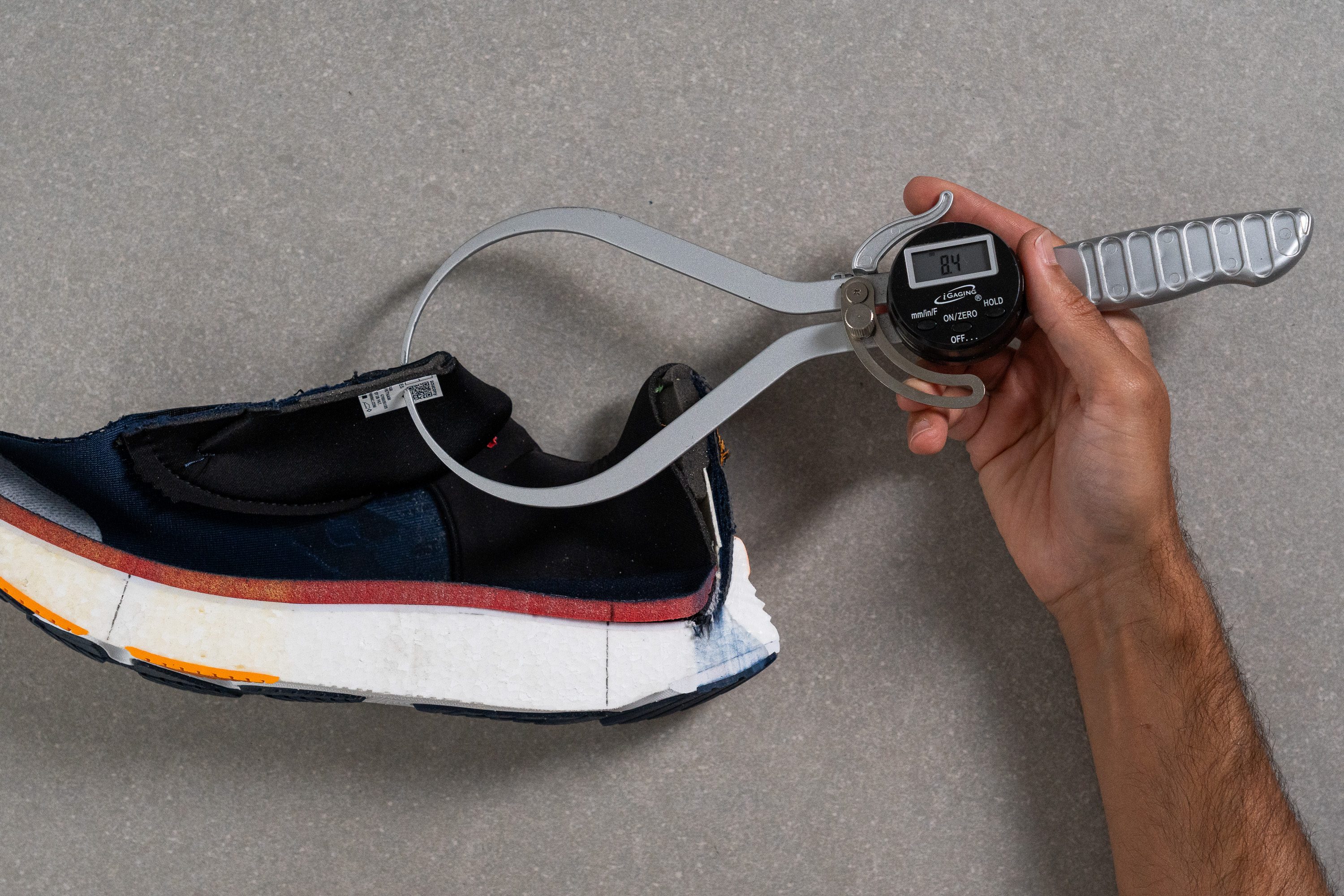
| Hurricane 24 | 8.4 mm |
| Average | 5.7 mm |
Tongue: gusset type
We found that the tongue isn't fixed to the sides, which is a significant letdown.
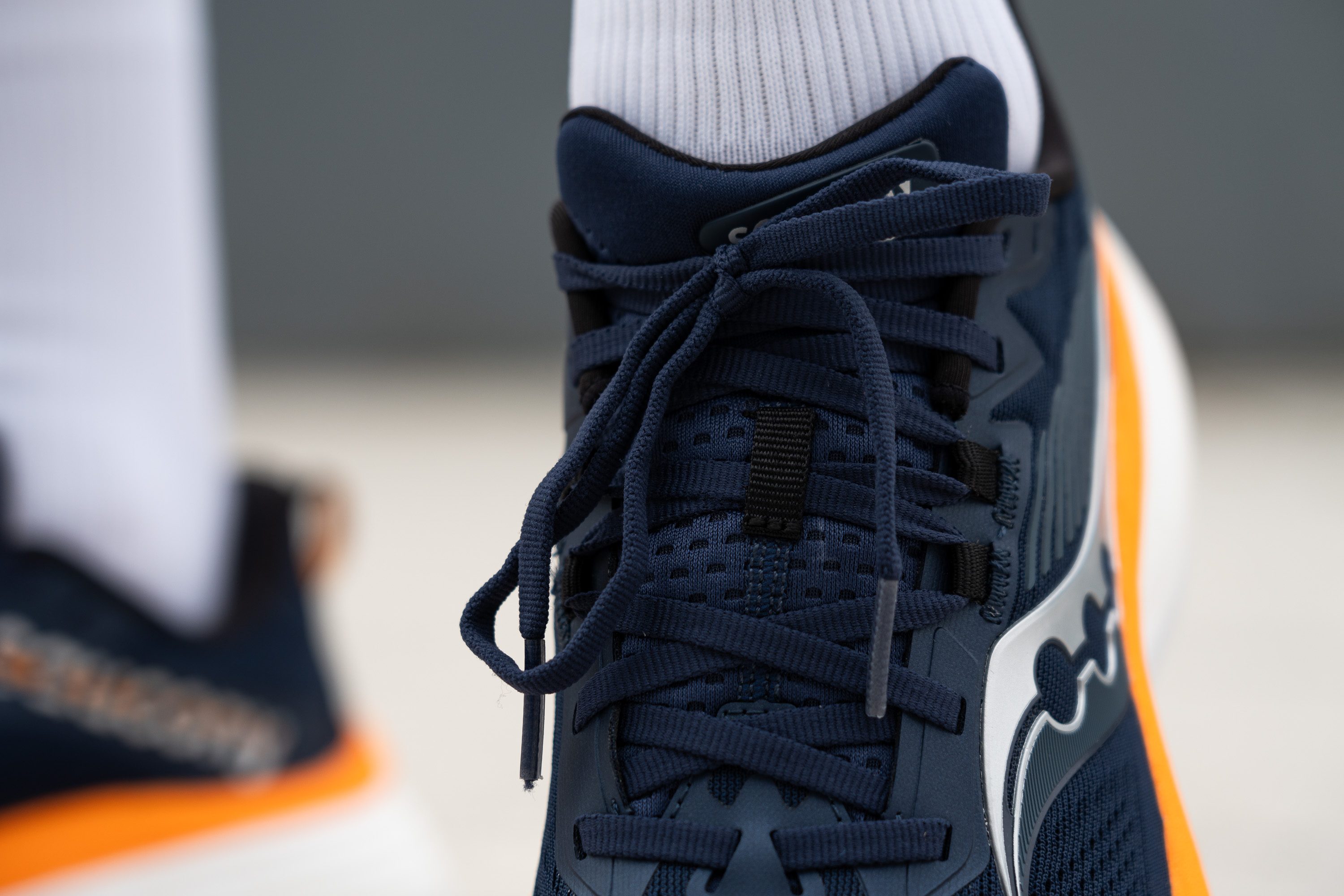
We might overlook this in a $100 shoe, but with the Hurricane's MSRP falling into the higher-end spectrum, the lack of a gusset is disappointing. We hope Saucony reconsiders this oversight in the next version.
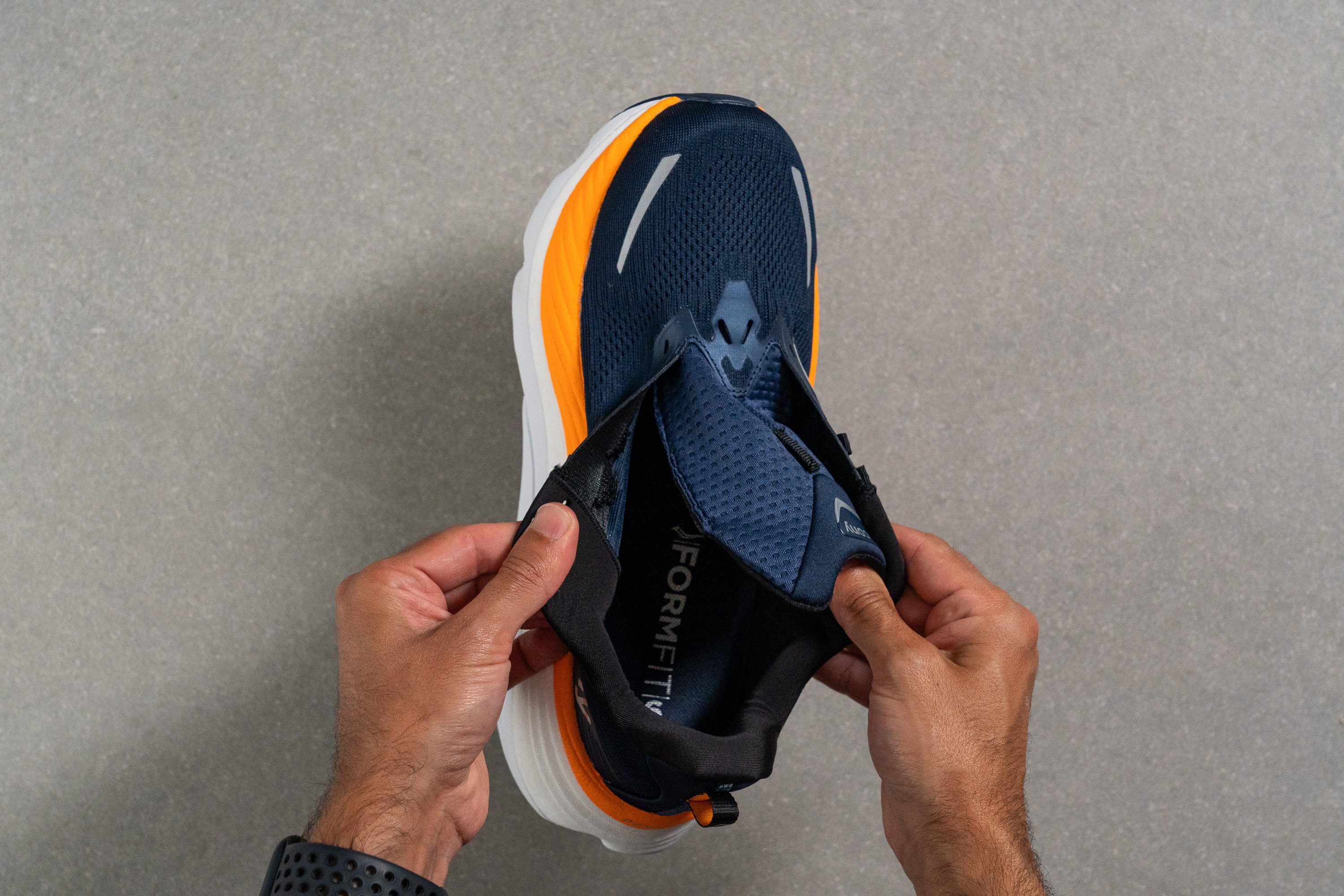
| Hurricane 24 | None |
Heel tab
The Hurricane 24 includes a robust and handy finger-loop heel tab—an excellent feature that adds only a few grams, and we really appreciated it!
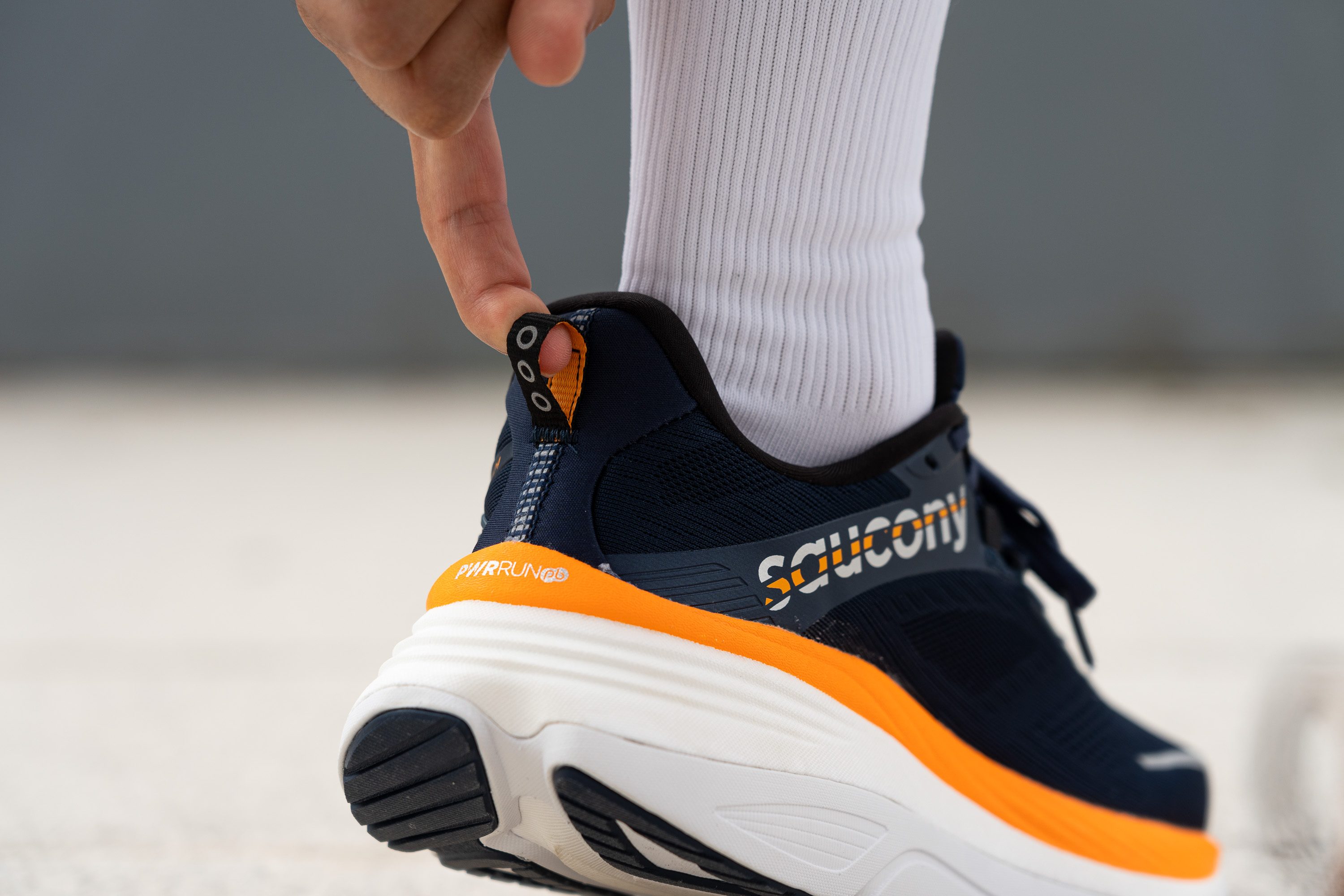
| Hurricane 24 | Finger loop |

